Sheila Wray Gregoire's Blog, page 91
January 22, 2019
10 Ways to Get the Spark Back in Your Marriage
How do you get that spark back in your marriage if you feel like you’ve lost it?
How do you rekindle that excitement about being together if you feel like you’ve just become roommates?
Never fear! I totally believe this can be done.
I recently received a question from a husband who said:

Reader Question
My wife and I have been married for almost 30 years, kids are out of the house, and we are just focused on each other. There are times that I feel our relationship has become more like friends instead of husband and wife. My wife says she is happy the way things are, and I am not. I want to make it clear, she is the women of my dreams…I wouldn’t want anyone else. I just want to get some of that spark back in our marriage.
What is that “Spark” in marriage in the first place?
That spark is when you’re excited to spend time together.When you have something important happen in your life, they’re the person you want to tell first. You want to touch them when you have the chance. You feel blessed to be with them. And you find the time you spend with them some of your favourite times in your life.
That’s honestly what I feel for Keith. It really is.
Now, here’s the thing: we tend to think that the spark is sexual in nature. But instead, I believe that sexual desire and that urge to have more fun in the bedroom and become more adventurous in bed and feel all that passion is actually a result of the spark. Even in a relationship built solely on sexual attraction, that “spark” will fade. You aren’t always going to be excited by them. No, what keeps the spark alive is an underlying and deep friendship where you feel as if you can be vulnerable, you can be yourself, and you’re drawn to one another. When we’re “truly known”, then our guard can come down. And that’s when the spark is fuelled!
What if the 'spark' doesn't have to die? What if the thing that keeps it alive is an underlying and deep friendship?Click To Tweet
Often what happens with couples is that they stop sharing the deep stuff, and that’s why desire fades. You can know everything about someone and not really know someone. When we’re becoming emotionally vulnerable and communicating about the stuff that’s going on in our hearts, there’s always more to talk about! But when you’re communicating on a surface level, you can run out of things to say pretty quickly.
I think as you find that spark again, sex is also going to become much better (and we’ll be talking about that a lot leading up to Valentine’s Day!). But let’s put first things first and figure out how to rebuild that emotional intimacy that you need to feel really connected.
10 Ways to Rekindle that Spark in Marriage
First, let’s put good habits in place so that you each feel like a priority and so that you have natural times to talk to one another.
1. Go to bed at the same time
Don’t spend all night on screens, and then come to bed when the urge strikes you. Adults need bedtimes, too! As much as possible, and as much as your work schedules allow, go to bed at the same time. There’s something about going to bed together that can be very intimate, even if sex doesn’t happen. You’re able to process your day together. You can catch up on what’s happening tomorrow. You can touch each other before you drift off. You can pray together!
And let’s be realistic–sex is far more likely to happen if you’re in the same place at the same time. Most sex is spontaneous. You don’t plan for it. But you can’t be spontaneous if you’re not together!
2. Have a morning check-in
Connect every morning, even if just for a few minutes. Let each other know what you’re planning on doing that day, and what are the big things on your list. Ask each other these two questions:
How can I pray for you today?
What do you need from me today?
3. Share your high-low of the day
Sometime in the evening, whether at dinner or on a walk or whenever, take a few minutes and share two things with each other: What was the time that you felt most “in the groove” today, most energized, most excited? And then what was the time when you felt most defeated, most frustrated, most like you were just slogging?
Sharing these things helps your spouse in on your emotions. And this exercise is far easier for many people, especially introverts, than asking “how was your day?” or “what did you today?” Instead of listing everything you did, you just talk about the things that affected you most, letting your spouse in, but also giving you an opportunity to process things.
4. Have dinner at a table and use candlelight and talk
Going to bed lends itself to conversation–but so does dinner time. Instead of having dinner in front of a screen, try sitting at a table together and just talking. Make it a habit. And that routine is key! If you can’t do it every night, how about just Tuesdays and Thursdays? Or Mon-Wed-Fri?
Especially when you’re empty nesters or newly married, and you’re the only two in the house, it’s easy to let these routines slide. But they matter.
5. Turn off the screens
Speaking of screen-free time, what about choosing a night of the week where you’ll have no screens? On that night you’ll play a board game as a couple, do a hobby, or exercise together. It doesn’t need to be every night, but pick one night a week and stick to it.
6. Do a hobby together
Finding something new to do together can be awfully exciting.
Keith and I enjoy birding together, but I’m not as much of a fan of it in the deep winter as he is. It’s cold here right now! But something else we enjoy doing together is tracing our family trees.
Here’s something cool that Canadians may pick up on. Remember the Battle of the Plains of Abraham–that historic battle in 1759 in Quebec City where England won over France, and New France became British? We have pictures of us visiting the battle site when the kids were little:

This cannon ball got lodged into this tree trunk during the Battle of the Plains of Abraham–and it’s still there!
Well, this weekend we learned that Keith has an ancestor named Abraham Martin (“The Scot” he was called). He was one of the first three settlers in New France. And the Plains of Abraham was named after him!
That’s a little thing (though it may take all my Canadian readers back to their grade 5 history), but it’s just kind of fun to learn this together. When we do new things, we have new experiences. That’s more to talk about. More to get excited about. More to share.
I have a list of 79 hobbies you can do as a couple–and you can even download that list here.
7. Volunteer Together
Serving together can also bring you out of a rut. When you give of yourselves, your life gets bigger. You realize that God made you for a purpose. That, in and of itself, is exciting! And when you share that with your spouse, then you each feel a part of something beyond you.
Find a ministry at church that you both are passionate about. Maybe it’s volunteering for the junior high group, or teaching Sunday School. Maybe it’s doing hospital visitation, or even serving on a worship team. Just find something that you can do together.
8. Do new things that involve moving–ballroom dancing; tennis; squash
Here’s another big reason life gets boring: We don’t move! There’s something exciting about using the bodies that God gave us and about getting our heartrate elevated. So find something new to do that involves moving, whether it’s ballroom dancing, a sport you do together, even bowling. It doesn’t have to be super hard. But doing something physical brings us out of screens and out of our heads and tends to lead to a lot more laughter.
9. Kiss or touch whenever you reunite after being apart
When you come in the door after work; when you see each other again after doing separate errands; when you arrive back inside the house after shovelling the driveway or doing the gardening–just touch each other. Better yet, give each other a kiss! Scan for opportunities to connect, and make it a habit whenever you reunite.
You’ll notice that none of these things is earth-shattering.
None is even that difficult! But all of these things start falling off the wayside when we get busy with other concerns. Kids take over and we stop connecting. They get our attention. Jobs get busy. We start wasting time and we get into bad habits.
These habits help you feel connected. They give you things to laugh about–but also opportunities to laugh together. And when you laugh, when you share, you feel more connected.
So if you want to stop the drift in your marriage, just go back to doing those small things, each and every day, that make your spouse feel like they are most important to you. Usually on Tuesdays I tell you to pick one item from my Top 10 and do it. This one I’m going to say–try to do all of them. Because they all are just part of a healthy marriage and a healthy life.
You can stop the drift in your marriage. Get back to doing these small things for one another:Click To Tweet
And then,
10. Try 31 Days to Great Sex!
If what you really need is to bring that spark back sexually, try the 31 Days to Great Sex challenge! It’s got all kinds of challenges in there that will also help you be more affectionate; help you flirt more with your husband; help you open up and talk more about what you want. But then there are all the challenges that will help you spice things up, try new things, and get out of that rut.
Bring that SPARK back to the bedroom!

31 Days to Great Sex: 31 Days. Just $4.99 for the ebook version.
Flirt More. Be More Affectionate.
Spice Things Up!
Let's try it!
You can find that spark in your marriage again! And it doesn’t have to be a huge change. Just start these little habits, everyday, and see how much more connected you’ll feel.
Let me know in the comments: Have you ever felt like you were in a rut? How did you break out of it?
You should also check out:

One Thing Most Couples Get Wrong about Date Night


50 Conversation Starters for Couples

10 Ways to Signal Yes to Your Husband
Author
Social Media
Sheila's Best Posts
Books
Courses
Freebie
 Sheila Wray Gregoire has been married for 27 years and happily married for 22! She loves traveling around North America with her hubby in their RV, giving her signature "Girl Talk" about sex and marriage. And she's written 8 books. About sex and marriage. See a theme here? Plus she knits. Even in line at the grocery store.
Sheila Wray Gregoire has been married for 27 years and happily married for 22! She loves traveling around North America with her hubby in their RV, giving her signature "Girl Talk" about sex and marriage. And she's written 8 books. About sex and marriage. See a theme here? Plus she knits. Even in line at the grocery store.
 Find Sheila Here:
Find Sheila Here:
Facebook
Twitter
Instagram
YouTube
Pinterest
Sheila's Favorite Posts on To Love, Honor and Vacuum:
10 ways to initiate sex
10 Effects of Porn on Your Brain, Marriage, & Sex Life
Why So Much Marriage Advice is So Trite
How can Sex be Hot and Holy at the Same Time?
Check out some of Sheila's Books:
The Good Girl's Guide to Great Sex
31 Days to Great Sex
9 Thoughts That Can Change Your Marriage
To Love, Honor, and Vacuum
Check out Sheila's Courses:
The Boost Your Libido Course
The Whole Story: Talking to Your Daughter about Sex, Puberty, and Growing Up
The FREE Emotional Intimacy E-Course
Are you ready to take your marriage to the next level?
Sign up for our emails and get access to the TLHV free marriage and parenting resource library. We have over 25 downloads and are constantly adding more. Sign up here!

The Best 31 Days of Your Marriage!
Read a few pages. Do what it says. Have incredible fun!
Learn to talk more, flirt more, and even explore more! You'll work on how to connect emotionally, spiritually, AND physically. And the ebook version is only $4.99!
.
January 21, 2019
Can an Emotionally Abusive Marriage Heal?
Can a marriage emerge from emotional abuse to be healed–to feel whole and intimate?
Last week was a depressing week on the blog. It really was a hard slog. I took an in-depth look at the book Love & Respect, and talked about how the Love & Respect enabled emotional abuse. And then so many of you shared your stories of dysfunctional marriages that were rooted in bad teaching like Love & Respect.
And I had so many of you saying: Can you please share stories of couples who actually healed from emotional abuse–couples who didn’t divorce, but came through on the other side?
Some of you did leave those stories, about how once you learned to enact boundaries, your marriage did get better. And it reminded me of a story that I shared several years ago on this blog, that I think it’s time to share again. So let’s take a look!

Emotional abuse is always wrong.
It is not, however, always straightforward.
Sometimes emotional abuse is caused by a narcissistic, or even sociopathic, spouse. One of the most profound books I’ve ever read was Scott Peck’s People of the Lie. It was all about toxic people who are simply evil. Most evil people are married, hold down good jobs, and look respectable. But they try to control people, usually by ignoring truth and redefining reality. It makes those around them feel crazy.
It is these kinds of people who often gravitate towards positions of in churches that are very hierarchical. It is these kinds of men who gravitate towards beliefs about marriage where the husband always has the final say and the wife must submit to his wishes no matter what. It is mostly (but not exclusively) these kinds of people that Leslie Vernick was writing about in her book The Emotionally Destructive Marriage.

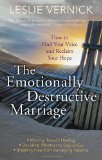
The Emotionally Destructive Marriage
by Leslie Vernick
Take Me There!
Other times, however, emotional abuse starts from two people in a stressful situation who don’t handle that situation well–and who start developing extremely toxic and counterproductive coping patterns.
It’s not personality disorders as much as it is a difficult stage of life.
I’ve been writing a lot lately on how to stand up to a controlling husband and how to make sure that you’re not enabling sin.
Today, though, I’d like to share a real-life story of a woman who went through emotional abuse in her marriage–and who emerged on the other side.
'How one woman worked through emotional abuse in marriage--and emerged on the other side.'Click To TweetWhen what you’re dealing with is not a personality disorder (like narcissism) but instead negative interaction patterns, then you can get through abuse. And I think this is so important to understand, because sometimes we paint all abusive behavior as so terrible that it can never be recovered from.
Human behavior isn’t that simple.
My good friend Natalie from Flying Free has been writing a lot about walking through a marriage where narcissism is prevalent. That’s something that you can’t get through save from an extraordinary miracle from God. And I am not trying to say that those of you who are married to a narcissistic spouse should just try harder.
What I am trying to say is that it’s possible to develop really destructive interaction patterns without meaning to–especially if you’ve been raised in a church culture where you were taught that if a woman disagrees with her husband she’s disrespecting him, and that he should get unconditional respect.
Relate to this? You may also enjoy:
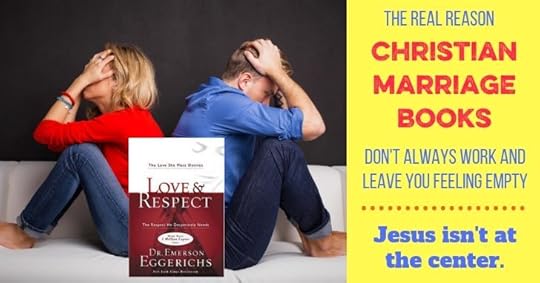
The Fundamental Flaw in the Book Love & Respect

Why Unconditional Respect Doesn’t Work
Ronni Peck, aka The Screenwriter’s Wife, shared her own journey of how emotional abuse started–and how they got out of it. And I want to highlight a few things that we can learn from her journey:
Stress and job loss can do horrible things to people.
Here’s Ronni’s story: When their first child was a year old, all of a sudden her husband found himself out of a job because the company he worked for went belly up.
As month after month of unemployment passed, KP found himself struggling with purpose. His morale and self-esteem were low. He questioned himself, his writing, his dreams.
This was the starting point of her husband becoming abusive. At the same time, Ronni was feeling isolated, which made it easier for her husband to manipulate her.
We need a community to help us keep perspective.
Ronni writes:
Early on in our marriage, because I wasn’t as passionate about a particular career path as KP was of his writing dreams, it seemed a natural choice for me to leave behind my unsteady entertainment industry job for the steady income of a teaching position. After a year in a brick and mortar school, I further transitioned to a work-from-home online teaching position, a position that I enjoyed.
However, I’m already a bit of a homebody and so my social outlets gradually dwindled down only to KP’s circle of friends. I had no local friends of my own.
It was in this environment of stress and isolation that her husband started belittling her.
One of the characteristics of emotional abuse is the abuser needing to feel as if the other person is always at fault for something.
When emotional abuse stems from a feeling of inadequacy itself–as in the case of job loss–then it usually manifests itself in having to feel superior to someone else. Here’s how Ronni describes it:
No matter how our fights started, they always included KP telling me some or all of the following:
That my memory was faulty and unless I could “prove” what I thought was said in a previous conversation, that I was wrong and had no clue what I was talking about.
That everything I said was really a subtle attack against him. No matter what I tried to discuss, it was always turned around into how I was victimizing him. If I did not recognize how I was attacking him, it was because my memory and interpretation of situations were inaccurate.
That I did not keep the house clean, and never did the dishes or vacuumed or laundry, and this showed how irresponsible and lazy I was and how I didn’t care about our family.
That talking to me was like talking to a child and until I could grow up and accept responsibility for my actions (i.e. the state of the house and my attacks on him), that nothing I said was worth listening to.
Then, at some point in the argument, usually when it was at its highest convoluted peak, he’d tell me that talking to me was pointless since I was never going to change or grow up. Then he’d leave the room (and sometimes the house) and refuse to talk to me until I apologized. Which I usually did, hours or days later.
Do you see how so much of this has to do with one spouse challenging the other’s memory and interpretation of the past? It’s this constant redefining of history that is so confusing for someone walking through emotional abuse. You can never work anything out, because if you try to bring up a time you were upset, somehow the abuser turns it into “you’re remembering wrong” or “by feeling that way you’re abusing me.” Your feelings are always suspect.
Here’s how Ronni experienced it:
I questioned my own thinking, was I really misremembering situations? Was I really subtly attacking him with everything I said? I live far away from family and I had no local friends to be a sounding board to help me gauge the accuracy of my thoughts. I felt like who I was…had slowly diminished away.
Support is necessary. Boundaries, however, are too.
We need to support our spouses when they’re struggling. But you can still have boundaries which say, “when you insult me or criticize me I’m going to remove myself from the situation” without meaning that you aren’t supporting him. Boundaries are important, too, and Ronni didn’t have boundaries.
Though he was often grumpy and short with me, I knew that these actions were likely a passing phase and I wanted to be a good, supportive wife in this difficult time for him. So I put up with his moods. I tried to be extra kind and sympathetic and strong for him by willingly accepting his cranky criticisms. I figured I was giving him time to work through things, and by not putting up a fight to these early criticisms, I thought was “helping” him to come out of his funk and showing him that I’d always be by his side no matter what life brought us.
But that’s not what happened.
Instead of seeing my sympathy as a lifeline drawing us closer together, he instead capitalized on the opportunity I didn’t realize I’d given him: the opportunity to use me as an emotional whipping board.
Do you need to learn how to enforce boundaries?
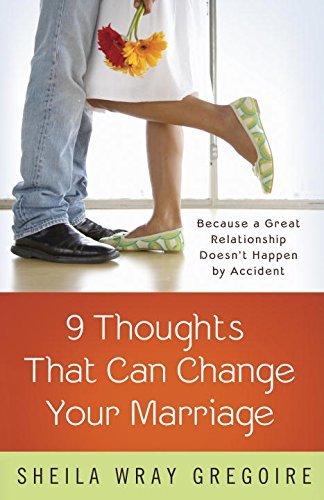
Learn how to ask for what you want, and how to point your husband to Jesus–
so that you both have the kind of marriage you need.
Here's how to get there!
She knew that the abusive behavior went against his basic character.
Here’s the defining difference between what Ronni went through and what someone married to a narcissist is going through: Ronni knew that this behaviour was atypical. She writes this:
During that time when our marriage was really tough and I felt so lost – I could have given up on it. A lot of other people in my shoes probably would have. But I knew my husband deep down, and I knew that he wasn’t always like this, and I knew that the good guy that I married was still in there somewhere…
I knew he could be a better man than he was showing me at that time.

How did she start rebuilding their marriage? She started enforcing her own boundaries.
But I also finally realized that I did not just have to sit there and take what he was throwing at me. I did not have to submit to his frustrations with his own life. I didn’t have to give up on him or on our marriage –but I also didn’t have to remain under his emotional control anymore either. Even though KP may have been 85% of the problem, it wasn’t until I accepted responsibility for my 15% and stopped giving in to his emotional manipulations were we able to move toward true reconciliation as a couple.
Here’s how she explains it:
Once I started exerting more independence for myself, an interesting thing happened. KP stopped having control over my emotional state…If he started to criticize, I let the criticism roll right off me. I’d answer rationally and calmly if I needed to, but otherwise, nothing negative he said could penetrate my emotions. I told him I loved him and wanted to stay married to him, but I wasn’t going to do this fighting thing anymore. I was over it… In a way, it seemed like I became more cold with him, but in reality, I was acknowledging that my emotions were not affected by him anymore.
And slowly, but surely, things started changing between us. Once KP realized that he couldn’t get that emotional rise out of me, he had no reason to continue pushing.
She stopped “the dance”.
'Stop participating in the emotionally abusive 'dance' in your marriage if you want real change!'Click To TweetI’ve heard this back-and-forth emotional argument called “the dance” by some therapists. He pushes that button, you respond by doing this, that in turn causes something else, and so on, and so on.
But if you refuse to dance–if you don’t respond to it–then it can, over time, end some of the behavior. You just don’t participate anymore.
Ronni has written another lengthy post on how to recover from a difficult marriage, and it includes such things as becoming committed to the marriage; finding a third party to talk to; believing the best; trying to find the win-win–all things we talk about on this blog. And she and her husband have emerged from that really trying time, and she even asked her husband to write some of the post on emotional abuse.
I wanted to share that today to give some of you hope that marriage can get better–that it can heal from emotional abuse.
I know that this may still sound depressing, but to me it’s really hopeful. It says that, in quite a few cases, even if the marriage is really difficult, by changing how we react, we can actually grow intimacy again. To me, that’s good news!
Now, Ronni’s situation was unique in that her husband was not physically dangerous, and his abuse was mostly caused by job stress, his own feelings of inadequacy, and her not standing up to him.
Sometimes, however, abuse is caused because the other person truly is narcissistic or dangerous. In those cases, enforcing simple boundaries can result in violence. If that is the case with you, please contact an abuse shelter and get some help. If your husband hasn’t been violent, but you’re worried he may be violent, call an abuse hotline to talk, or please find a counsellor to talk to.
So let’s not assume that abuse necessarily means that a marriage is over. Even if you’re in a marriage where he routinely dismisses your needs, or you feel like you’re invisible, if you stop the dance, and start enforcing boundaries, you may just find that your spouse responds positively–and you get that intimacy that you’ve wanted.
You may also benefit from:

How Do I Know I’m Being Abused?

How Do I Admit to Myself I’m Being Abused?

When Your Husband Won’t Change: Is this the Last Straw?

10 Signs You’re Respecting Your Husband Too Much
If you’ve been through something like this, let me know in the comments: how did you stop “the dance”? Or how do you know the difference between a narcissist and someone just going through a really difficult stage of life?

Author
Social Media
Sheila's Best Posts
Books
Courses
Freebie
 Sheila Wray Gregoire has been married for 27 years and happily married for 22! She loves traveling around North America with her hubby in their RV, giving her signature "Girl Talk" about sex and marriage. And she's written 8 books. About sex and marriage. See a theme here? Plus she knits. Even in line at the grocery store.
Sheila Wray Gregoire has been married for 27 years and happily married for 22! She loves traveling around North America with her hubby in their RV, giving her signature "Girl Talk" about sex and marriage. And she's written 8 books. About sex and marriage. See a theme here? Plus she knits. Even in line at the grocery store.
 Find Sheila Here:
Find Sheila Here:
Facebook
Twitter
Instagram
YouTube
Pinterest
Sheila's Favorite Posts on To Love, Honor and Vacuum:
10 ways to initiate sex
10 Effects of Porn on Your Brain, Marriage, & Sex Life
Why So Much Marriage Advice is So Trite
How can Sex be Hot and Holy at the Same Time?
Check out some of Sheila's Books:
The Good Girl's Guide to Great Sex
31 Days to Great Sex
9 Thoughts That Can Change Your Marriage
To Love, Honor, and Vacuum
Check out Sheila's Courses:
The Boost Your Libido Course
The Whole Story: Talking to Your Daughter about Sex, Puberty, and Growing Up
The FREE Emotional Intimacy E-Course
Are you ready to take your marriage to the next level?
Sign up for our emails and get access to the TLHV free marriage and parenting resource library. We have over 25 downloads and are constantly adding more. Sign up here!
January 18, 2019
Your Stories of Women and Marriages Damaged from Love and Respect
This has been a wild week on the blog as we have looked at Love & Respect by Emerson Eggerichs, one of the best selling Christian marriage books.
I intended originally to write only a post about how the book approached sex, but the outcry was so immense that I decided I had to look at the book’s arguments as a whole. I didn’t intend to devote a whole week to this, but obviously it struck a chord. And so I’d like to make this post a repository for the hundreds of comments that have come in over the last week. I think it’s important for them all to be in one place. I can’t post them all–though I do appreciate them all–but I’ll try to give you a sense about what they all say. For reference, here are the posts from Love & Respect this week:

How Love & Respect Gets Sex Horribly Wrong

Why Unconditional Respect Doesn’t Work

The Fundamental Flaw in the Book Love & Respect

But first, I want to address a critique I’ve heard, and then I’d like to call us to something more.
This is not about me, or anyone else, misunderstanding Eggerichs’ points in Love & Respect
I honestly have not had very much pushback about my posts at all. In all of the comments, on all the platforms, only 11% were from people saying they liked the book, or telling me that my posts are unfair. Usually when I write a controversial post, the comments are about 50/50. That tells me that most people already realized there was something wrong with Love & Respect, they just needed words to express it.
When people have spoken up, though, it’s been in an attempt to clarify what Emerson Eggerichs meant. I’ve had people saying, “but he didn’t mean what you said!” or “you’re cherry picking.” Others have told me that if I just watched the DVD series I’d understand better. Others have suggested that I ask Emerson directly what he meant.
I believe that these people, though well-meaning, are missing the point. It’s not whether or not I’m mischaracterizing Eggerichs or misunderstanding him. It’s not even about me.
It’s the fact that all of these hundreds of women can read the book and see exactly the same thing that I did–and that these hundreds of women can say that the book contributed to very dysfunctional, if not abusive, patterns in their marriage.
Now, maybe Eggerichs doesn’t actually believe the things that I’ve said about his book. If so, then he didn’t write Love & Respect very well, because so many of us interpreted it the same way–in the way that hurt women.
Or perhaps his views have changed since 2004, when he wrote it. That’s wonderful!
But in both cases, the answer is not to say, “that’s not what he believes!” The answer is for him to withdraw the book and rewrite it to convey better what he does want to say. Or, better still, to take some time to reflect about how his views on marriage may not actually be biblical.
Because these women’s stories matter. You, my dear readers, matter. To say that there’s nothing wrong with the book is to say that all of these hundreds of women just misunderstood, which basically means “well, you’re too stupid to see what he was trying to say”, or else it means “well, if they had just done what the book said, they’d be fine, so it’s all their fault!”
No. When this many people read a book and get a terrible outcome, the problem is not that they misunderstood. The problem is the book. In medicine, if a doctor were to prescribe a drug that left even 30% of people harmed, but 70% of them helped, that doctor would cry to the rooftops to get the drug withdrawn. In this case, I think it’s far more than 30% harmed.
So what is the next step? What can we do about the harm Love & Respect is having?
As I mentioned in my podcast yesterday, what blew me away was that so many of you agreed with me. This is truly a case of The Emperor Has No Clothes. This book is a best-seller. When churches want to do marriage courses, they tend to turn to this book. And yet so many of us don’t like the book, but we don’t speak up because we assume we’re the only ones. We assume there’s something wrong with us.
After all, Focus on the Family publishes it. Everybody buys it. It must be good, right?
We must start using discernment. So here’s what I’d suggest:
Next time someone mentions the book, tell them what you think.
Don’t just nod or change the subject; let them know gently that you feel the book is harmful to marriage, and tell them why. Even send them these posts!
If your church wants to put on a Love & Respect study or a Love & Respect event, speak up.
Don’t just refuse to go but stay silent. Talk to the church leadership. I honestly believe that most churches do not realize what it is that they are promoting. My own church, which very much values women, has been running a Love & Respect study, and I’m going to talk to my pastor about it when he’s back from vacation. I know he would be appalled if I shared just Monday’s post with him, let alone the others. Speak up.
Remember there are other books.
Marriages will not fall apart if we stop using Love & Respect. If it’s helped some marriages, that’s great. But if it’s hurt a significant portion of those who have read it, then we need to find another book to study instead. For women, I’d recommend 9 Thoughts That Can Change Your Marriage.
Consider contacting Focus on the Family.
The book is published by an arm of Focus on the Family. Focus was under different leadership in 2004. I have been on the Focus show several times; I know the leadership. I have a very difficult time believing that they would condone what Eggerichs said about sex or the advice he gave to women in abusive marriages. One person left a comment this week saying that Focus on the Family sent a fundraising letter, offering to send them the book Love & Respect in exchange for a donation. If you get such an email, write back and tell them why that’s harmful.
It’s okay to speak up. You matter. Your dignity matters. Women matter. Marriages matter. And we all deserve more than this, but we will not get it unless we start demanding more from publishers, churches, and pastors.
We all deserve more than Christian books that tell women that all men lust and that they must have sex or their guys will stray or that tell women that speaking up is disrespectful. But we will not get it until we demand more from publishers & pastors.Click To Tweet
And now I’d like to give all of you the chance to speak up. Here are your comments from this week about Love & Respect:
I was overwhelmed by how many comments were left, both on these posts and then on Facebook as well. And so I asked my assistant Joanna, who has a graduate degree that involves a lot of data analysis and statistics training, to curate them for me. So here’s Joanna:
I’m one of Sheila’s assistants and we’ve all had bees in our bonnets for the last week over this book. Sheila asked me to give a look through the comments to help curate them for this post. To organize them a bit, I chose to do a quick (and I do mean quick – my baby girl has had a fever for the last 24 hours so I’ve got a true need for speed) thematic analysis of the comments that were left on the blog posts for Monday-Wednesday, as well as the comments that were left on the first Facebook post Sheila put out about Love and Respect last week.
I put all of the comments into a spreadsheet and marked when they were posted, who posted them, and a few other housekeeping variables. Then, once I had it all organized, I created categories for the comment content (an example: “this book made my marriage worse”). When a comment had a particular theme included, I’d mark it. Additionally, as I went along, if I found a new theme, I added it to the list as well and then went back through if there were previous comments that also hit upon it. Comments, then, may be in multiple categories.
Obviously, the sampling for this exercise wasn’t done scientifically. But, despite our limitations, we did get an amazing group of comments and I think the themes that emerged were really powerful.
As I did my work, I found myself snuggling my little girl and promising that we at To Love, Honor, and Vacuum were working hard in the hope that, by the grace of God. the Church we leave to her is better than the one we inherited.
All right! Onto and upward what we found!
The first major finding here is that the posts on Love and Respect have had huge responses. I ran a t-test on the results of the number of comments on these posts and on Facebook versus other posts in January over the years, and it was statistically very significant.
I want to show you the big picture findings of what people said, but then I want to include some comments afterwards to show you the breadth of hurt that people are experiencing because of the book.
The themes I identified (number of comments that hit on each theme and the % of all comments with that theme are in brackets afterward) were the following. Please note that numbers don’t add up to 100; people could be in more than one theme:
Here were the positive statements about Love & Respect (and again, many people were in both groups; only 25 people were positive):
Love and Respect (book, classes, seminar, or some combination thereof) is/are a favorite of mine; I like it/them (16, 7.3%)
Love and Respect was helpful to me (25, 11.4%)
Everybody else said very negative things about Love & Respect:
Love and Respect contains bad theology or is unbiblical (25, 11.4%)
Love and Respect made me feel belittled as a woman (8, 3.7%)
Love and Respect made my relationship, or the relationship of someone close to me, worse (20, 9.1%)
Love and Respect is dangerous and could facilitate abuse (27, 12.3%)
Love and Respect drove me away from Christ (1, 0.5%))
Love and Respect facilitated abuse or cheating (15, 6.8%)
I threw away, considered burning, or burned Love and Respect (4, 1.8%)
Love and Respect was supported from the pulpit or by pastors at my church, which was upsetting (17, 7.8%)
Love and Respect was supported by my friends at church or by the lay leaders of my church, which was upsetting (7, 3.2%)
Love and Respect makes love seem conditional, that’s wrong (3, 1.4%)
My husband hated Love and Respect (1, 0.5%)
I participated in a Love and Respect class or seminar and disliked it (4, 1.8%)
Love and Respect puts undue pressure on women (20, 9.1%)
Love and Respect is sexist, man-centric, and/or mysoginist (12, 5.5%)
I felt something was off with Love and Respect, but could not articulate it (5, 2.3%)
My spouse/fiance/SO used Love and Respect to manipulate me (7, 3.2%)
Love and Respect relies too heavily on gender stereotypes (5, 2.3%)
I am thankful for this post on Love and Respect (39, 17.8%)
Love and Respect’s definition of respect is erroneous (13, 5.9%)
Love and Respect misses the fact that both women and men need love and respect and/or presupposes that women give love and men give respect naturally (27, 12.3%)
Love and Respect misses the fact that women also experience sexual desire and may in fact have a higher drive than their husband (12, 5.5%)
Love and Respect misses the fact that women having sex to keep men from straying is wrongheaded, pressuring women for sex is sinful, and guilting or shaming your wife is inadvisable (19, 8.7%)
I could not finish reading Love and Respect (12, 5.4%)
I did not like Love and Respect (50, 22.8%)
That’s the view from 30,000 feet. But what did commenters actually say within the themes? We’ve included a bunch of comments so that you can see the scope of the responses we’ve gotten over the past few days. We can’t include them all, obviously, but we do value all that came in. These included stories from women, and a few men, whose marriages were deeply hurt by the teachings espoused in Love and Respect.
So many women have reported being hurt by the book Love and Respect by Emerson Eggerichs--how it hurt their marriage and enabled their husbands' abuse of them. Here are their stories.Click To Tweet
Theme: Love and Respect made my relationship worse
I first read Love and Respect back in 2011 after a pastor provided the book and DVD to me and my then-boyfriend while we sought counseling for our troubled relationship. He was emotionally demeaning and physically abusive toward me, and often used Love and Respect as a weapon against me when he felt I was being disrespectful. He claimed since he was the man (and the spiritual leader of the relationship should we marry) and I was the woman (and therefore easily deceived), that I should respect him and his desires even if that meant I lost something of myself in the process. He had rules for everything, and if I broke them, he would claim I was being disrespectful and withhold his love and affection as punishment (and even report to his family and friends that I was causing problems in the relationship). It was a highly abusive situation, and I’m so glad that God gave me the discernment and strength not to marry him!
Thank you for this. I’m so sick of seeing this book recommended. These teachings were toxic to our marriage (my husband was a very, very broken man – “basically well meaning” doesn’t even enter into the discussion. He’s slowly healing, though). I haven’t read the comments, so I may be repeating, but my take on this book was basically: if Emmerson wants it but doesn’t get it from his wife, it’s lack of respect or overt disrespect. If Emmerson doesn’t want it (like the issue of picking up wet towels) but does get it from his wife, he chalks it up to lack of respect of overt disrespect. He writes over and over, “I didn’t feel respected.” He paints himself a great, big carte blanche. It’s largely about him, and the wife and the unit is distant second or third. My husband began using this tactic w/ me. We were taught this in church by the elders. “This is the best teaching on the man/wife relationship I’ve ever encountered” they told us. So, thank you for speaking out. We desperately need this.
Love and Respect was gifted to us at our wedding. Being anxious to make a good and God-honoring start to our marriage, I started reading it shortly after we got back from the honeymoon. I was so disheartened by Eggerichs’ depiction of a marriage relationship. As I was reading I kept thinking if I had read this before I got married, I would have stayed single! I wish I had our first year of marriage to do over again. I resented my husband for letting me pick up the slack in multiple areas of our life. I sent mixed signals to my poor husband while I was trying to pretend everything was okay because a godly wife should always be positive toward her husband. Being the “neat freak” in our relationship, his story about wet towels on the bed hit so close to home that it made me want to cry. I was overwhelmed and disillusioned by my marriage. To be fair much of my struggle should be blamed on my own immaturity and not directly on the book. But, at a time I could really have benefitted from solid encouragement to start healthy conversations and open up to my new husband about my concerns in our relationship, Eggerichs’ book pushed for the opposite under the guise of biblical authority. Nearly everything you wrote in this review was exactly how this book [a]ffected me and there were several other issues you didn’t even have time to cover. (Thankfully my husband doesn’t hold to this definition of respect. He has since read sections of the book and groaned. I now tell my newlywed friends your communication can get better and don’t follow this book.)
I can’t thank you enough for this article. I was introduced to this book while going through a separation with my now ex-husband, and it felt so demeaning at the time even though I did try to read it with an open mind and heart because I wanted help for our situation. I kept questioning my reaction, wondering if I was just being defensive, but it just felt like I was being told that I had an obligation to have sex with him, in spite of the horrible way he was treating me and our children. He certainly used it in an attempt to pressure me into having sex with him, in order to “fix” our problems. Please forgive the graphic description, but having sex during this point of our relationship made me feel almost like a prostitute, except I wasn’t trading sex for money–I was trading it for momentary peace in our home. And then, because of this book, I was told that I was required to fulfill this marital “duty” because if I failed to do so, then I bore the blame not only for any sexual sin that was caused by his deprivation, but also for his treatment of me because he was only reacting to me withholding something I was required to give. I fully believe that this book is well-intended, but it caused great harm to me. At a time when I was vulnerable and wanted desperately to be obedient to God’s Word, yet felt that I had to do something to protect myself and my children, this book, and the discussion of sex it contains, were used in an attempt to guilt and manipulate me. I am so grateful to see someone trying to explain the fallacies in its approach, because at the time I was introduced to it, I couldn’t think clearly enough to articulate precisely why it troubled me. Please keep addressing this issue–I know I’m not the only one who has been in that situation.
I’m sorry to say that I read this book and followed the advice given for men. Wholeheartedly throwing myself into showing my wife “unconditional love” with the hopes of restoring our marriage. Unfortunately for me this meant turning a blind eye to increasingly destructive behavior, immorality, and even abuse. All with idea that if I just showed her more love, she would all of a sudden wake up and realize that she really wanted me. Of course this didn’t happen and I turned to tough love instead. This didn’t bring her back either, we are now separated and divorcing. But at least i’m not living in the barren wasteland of sacrificing everything for someone that has no intention of ever sacrificing self for me. Not what I wanted, but better than the alternative.
I’m blown away. I read this book early in my marriage and took it all in… I can see now that it was only by the grace of God I didn’t end up in an abusive marriage. But I can also see why I enabled my husband in some very bad sin habits for years. These books weren’t taught from the front of church, but they were sure touted amongst the congregation- a church that ended up being spiritually abusive. How easily we are deceived! Lord forgive us!
Thank you for your review, Sheila! I have read this book and was raised in a church and family where this was the thinking on sex. My husband and I are still working hard (and successfully!) after nearly 24 years of marriage to undo the mess left by these unbiblical ideas.
Thank you for this! I have never read the book but I did listen to Eggerich’s podcast 3 years ago which covered topic and from his book. At the time, I got the sense that something was wrong in my marriage but I didn’t know exactly what. I would try to talk to my husband about it but he thought I was just too sensitive or not seeing things clearly (turned out this was gas lightings). So I wholeheartedly threw myself into Eggerich’s “The Rewarded Cycle” (basically doing your part in the marriage knowing that God will reward you regardless your spouses response). In spite of my efforts my husband grew more emotionally AND sexually distant and I fell deeper into desperate attempts to follow “Christian” marriage advice which really just led me into idolatry with my husband happily enthroned as the god of our home. I came to find out that he has a porn addiction which was beginning to escalate as I caught him surfing Tinder for girls. And this was after years of trying everything in my power to get his attention, sexually or otherwise. It turns out the problem was never me, it was an addiction that he had struggles with since before we were married. He was all to happy to keep his addiction and be waited on and doted on as god of the Home while never being held accountable for his actions as a husband or father. And sadly it was “Christian” advice like this that kept me locked in a “This must’ve be my fault” mindset for years. I’m so grateful that God has brought clarity to the real issue and that he has provided experts in the area of sexual addiction to help get our marriage back on track. Thanks again for speaking out!
Theme: Love and Respect is dangerous and could facilitate abuse
10 years ago I attended a L&R conference in an attempt to help restore my marriage with a negligent husband. We had been married 2 years, I was early in our first pregnancy, and he was staying out until 4am four nights a week. What he got out of their conference was “Men and women are made differently and have different needs, therefore I am just fine the way I am. It’s wrong to tell me that my behaviour is wrong for a married man, because as a man I don’t need to conform to what women think is appropriate behaviour. If we are going to stay married, we don’t have to fit our marriage into a box, it can be whatever works for us.” So I had to leave, 5 months pregnant, and we were never able to reconcile. I had totally forgotten until now what role that L&R teaching played in our marriage deterioration. Like you said, a healthy marriage could read the book and understand the point is to be unselfish, but in our case it just affirmed his selfishness.
I often feel like a lot of marriage books are fine if they are read by a “normal couple”, two good intentioned , unselfish people who look out for each other. They get a totally different meaning out of it, because the husband wouldn’t dream of treating his wife inappropriately, so the wife thinks that these books are ok. I was in an emotionally abusive marriage, I read ALL THE MARRIAGE books, including Love and Respect. (My husband and I took the course together as well). Nothing helped. I tried to be quiet, submissive and respectful and yet I KNEW how awful he was treating me, so then we would often have big arguments where I would try to explain how I felt. And it never ended well… I needed to work on myself , but that was only to become stronger in my faith, to spend more time in the word and to not treat my husband like he was going to fulfill/ complete me. I had to separate from him emotionally to be able to see what needed to be done. I started SPEAKING UP! I started kindly saying my own opinion, what I wanted , stopped letting him taking advantage of me, and more importantly STOPPED FEELING GUILTY ABOUT IT. I stopped engaging / arguing but I also stopped being a [doormat]. In our marriage[,] all the typical Christian marriage advice [d]amaged us greatly, because there was never any incentive for my husband to change, it was always me trying to fix everything. Anyways, after counselling etc, we are doing very well, we are in love again, we are experiencing a marriage like God intended. I feel hopeful, and I wish more people in the church could understand and encourage couples to mutually love/respect each other.
Wow Sheila thank you thank you thank you for this post today!! I wish I could’ve read this post years ago when the message of the book caused so much pain and damage to me in my emotionally abusive marriage. God did show me over time how so much in this book was false…He strengthened me with truth over the years so I could eventually leave a marriage filled with alcoholism, emotional abuse, and adultery. But you know what’s amazing? Someone is going to read this blog post and your links, and they are going to have the truth all upfront! Books like this, and the lies throughout it, won’t be able to hurt them and their families. Thank you Sheila for shining the light of God’s truth in the world. This is SO needed.
Theme: Love and Respect puts undue pressure on women
Thank you for writing and sharing this one, too! What a horrible book!!! Years ago, when in the throes of my husband’s sexual addiction, which had starting progressing beyond porn, a marriage mentor at our former church made it all about respecting him. She told me I was fully responsible for making him feel 100% respected and like a man. As a result, I secretly worked through the book, “The Respect Dare,” which is all about unconditional respect (aka, being a doormat to abuse and having no voice). Over the next year, our marriage mentor asked at every meeting if he felt more respected and if I felt more loved than the previous week. He happily reported each week that he was feeling more and more respected, while I was becoming severely depressed each week as I was feeling less and less loved. He was reaping the benefits of “unconditional respect,” while still fulfilling his sexual needs outside of our marriage, ignoring and neglecting my sexual needs, emotional needs, etc., and being verbally and emotionally abusive to me. Practicing unconditional respect, especially while my husband blatantly showed no desire to behave respectably, nearly killed me. I became near suicidal from depression. Fortunately we’ve gotten away from that person, and that church, we have found good counselors and recovery groups, and he and I are both much better today. But I agree with absolutely everything you wrote here. The idea of unconditional respect is SO harmful!
I too was given this book because they felt it really helped them understand their husband’s needs…. ..but I never could finish it all the way, and was left feeling guilty and completely hopeless. I can not tell you what a relief it is to read these posts you’ve done on it. I know some people might feel like its nitpicking, but I so badly wish I had seen this back when I was feeling so hopeless, so full of guilt and sadness! I do want to say my husband has never been abusive and has always been loving and supportive, willing to try anything I thought would help…I think though, marriage retreats, and books I read fed me so many lies and I consumed them all, and allowed them ALL to be placed on me. I remember going to a marriage retreat once…and just crying and crying because I was filled with so much guilt and pressure to be “perfect “. We haven’t been to another one since. The thing that is so sad to me…is it is the women who WANT to be great wives who pick up those books, who take the advice to heart…and I feel in my case anyway..it does exactly opposite. I gave up on ALL books and advice for a long while before I accidentally stumbled on your FB page. They have been so helpful, and healing(along with other authors) and so totally mind blowing for both me and my husband. So thank you so much for being willing to take on the hard stuff!
Thank you so, so much for writing this series! My husband and I went through the the love and respect series early in our marriage and, after years of following this advice, it nearly destroyed me and our marriage. I was tired, resentful, and feeling unloved. This book taught me that, as the wife, I always needed to be the one to sacrifice, to “break the cycle”. You know how this makes women feel? As though our husbands will only love us if we give them what they want, which is exactly what Emerson endorses.
My church regularly offers marriage classes based on Love & Respect because, “husband’s really enjoy the course.” I left with some insight on how I can be unintentionally disrespectful, but mostly feeling an inch tall. Shortly after the last class, in the middle of an argument my husband said (kindly), “I feel like you don’t respect me.” I had been working hard to use a nice tone and focus on the issue at hand, so I asked back, “Do you really feel disrespected, or are you just upset you’re not getting your own way?” He thought about this for a few days and decided it was the latter. I grew up with my mother being a doormat in the name of respect and my father walking all over her in return, and so my husband knew before we married I would not tolerate being in a marriage like that.
Thank you for this Sheila!!! I 100% agree, this is very dangerous teaching. It belittles women and can break their spirits especially in abusive situations. This is how I felt when given this book to read during my abusive marriage. It simply reaffirmed what my abuser preached from sun up to sundown… I was the problem and the one walking in sin. Thankfully, a dear friend walked with me through leaving and healing. She helped understand that I mattered, that my feelings, thoughts and voice mattered. Sadly, I still hear this faulty teaching in churches. Someone close to me recently encouraged me to keep quiet about my concerns with my (new) husband because I was blocking what God was trying to do in his life. She told me that even though I had valid points and hurts I needed to put those aside for the “bigger picture” (that my husband is supposed to be the head and lead, so that my family will be blessed). I’m sure this person meant well. But I could not reconcile the notion that speaking up about hurtful things (being out down, having my feelings being dismissed as not important, etc) could be out of the will of God. After reading this post I see what bothered me so much. The advice given was very much what comes from Love and Respect– keep quiet and show respect. *Sigh*
Oh my goodness I’m so glad I’m not the only one! I tried to read that during an extremely difficult time and had to put it away. I already was feeling like a failure trying to carry a heavy burden, and the book made it feel heavier with every page. Matthew 11:28 “”Come to Me, all who are weary and heavy-laden, and I will give you rest.”
Theme: Love and Respect drove me away from Christ
Thank you so much Sheila. I cannot explain to you how healing it has been to read your posts. I have stopped going to church mainly due to the issues you talk about. And I refuse to date Christian men because of this reason alone. I have had multiple male pastors and men in church treat me the way you speak about and teach these types of things. After I left a marriage where I was being treated this way, and was finally standing up for myself, I was actually accused by the male pastor of “leaving my faith” and that god had told him I needed to return to my husband. To which I replied “when I hear the same thing, I’ll be sure to listen”. Thank god I didn’t listen to him and go back or I’d still be in an abusive marriage. Thank you so much for shedding light on these topics that absolutely MUST be discussed. You are so brave. And I’m so grateful to be able to read your blog and see that I wasn’t crazy. That these problems are rampant in church and that they MUST be dealt with. It has been truly healing to read your posts and I cry, out of shear happiness when I read it knowing I am not alone and knowing that other women who are in similar situations also get to read these posts and hope that one day it might save them too
Theme: Love and Respect’s definition of respect is erroneous
So far as I can see, the dumbest thing about this is saying men respect naturally and need to be taught to love. Really? Never noticed that while caring for children. No matter the gender, children love naturally, but need to be taught what respect is and how to earn it. Age does not change this. Education and observation does. If a boy watches or hears his dad or other men treat women like plastic dolls, they’ll pick it up because they think these authority figures know how things work. Girls will do the same. And so it goes on for generations. Then those who know somehow that something is wrong but not what, get advice from books like this and the authority figures of the church, and the poisonous rot goes on.
The idea that love can be separated from respect is utterly ridiculous to me.
Also, reading the rest of your article and that awful story about towels, it appears this book promotes unconditional respect from women, but highly conditional *love* from men. He can’t even be bothered to ‘lie’ that he missed his own wife???? Awful!
Theme: Love and Respect misses the fact that women having sex to keep men from straying is wrongheaded, pressuring women for sex is sinful, and guilting or shaming your wife is inadvisable
Thank you, Sheila. It was through reading a different (negative) review of this book that I realized that I had been raped several times within my marriage. No wonder it’s so hard to trust or feel safe!
What you’re talking about is hugely important. I’ve been in therapy 4 yrs and [I’m] still struggling with guilt over whether or not I can say no to my husband re:sex. There’s an underlying lie that I’ve believed that tells me I don’t own my own body. Intellectually I know it’s garbage but a lifetime of messages teaching me how to be a “good wife” are difficult to disentangle. I keep telling myself I’m dishonoring God, myself, and my husband by having sex when I don’t want to (nearly daily). Maybe one day I’ll believe it.
Aside from the fact that it’s kind of hard to love a woman or meet her need for love if you show her no respect and treat her as a sexual object, making her responsible for your sin.
Hi, Sheila! I have been finding this series fascinating because I’ve been exposed to the faulty teaching for SO LONG. Interestingly enough, it hasn’t [a]ffected my husband- his response continues to be primarily Godly and unselfish. However, hearing continued teaching about “love” and “respect” did change MY view for the worse. I put expectations on myself for “keeping” my husband, rather than my seeking God. This has caused so many problems in our marriage, including my thought that sex had to occur so often (and it was up to ME to seek it) in order to keep my husband faithful. I remember having a conversation with a friend about the book where we discussed how men didn’t have any power over an urge to ogle a beautiful woman and how we needed to be available and try to look better (read: perfect) in order to keep them from looking. Wow. What pressure on ourselves when we try to constantly keep someone else from sinning. I love your straightforward approach in this piece to point us to the Lord and not to idolatry.
[“Y]ou are his release” This is just so gross and would make me feel deeply uninterested in sex! It’s like they are getting their ideas from porn, and considering how many men in church seem to have issues in that area it might be true. I wouldn’t trust relationship advice that refers to a woman as a ‘release’ not a person.
Theme: Love and Respect misses the fact that both women and men need love and respect
The oft-given explanation of the underlying verse for this book always cracked me up. “Women need to be commanded to give respect because they LOVE naturally, but don’t show respect naturally.” And conversely, “Men need to be told to love, because it doesn’t come naturally but showing respect does.” Ha! Talk about reading your own biases into that. Where, in the history of the world, are all these men who have “naturally ” shown respect to women?
I wonder how much of the “women just need love” stems from a deep-set, overarching, narrative in our churches and society at large that women are just not worthy of respect. When a woman gets overt and subtle messages that women aren’t respected for her entire life, then it’s not unexpected that she will reach adulthood and marriage just having given up on that as an expectation. So we tell women that they don’t get to be respected, and then we turn around and look at them and say “See? Respect isn’t important to women.” I think that’s what bothered me most when I read the book (many years ago), coming away with the idea that the author really believed a woman had zero need to be show respect as a person. That some warm fuzzies and emotional connection were the totality of her desire in relationships. I knew I wanted a man who would respect me (and I had one, he’s a great catch still!), but according to this book it meant I wasn’t in the category of “women.” I also have a higher sex drive, and that was apparently not in the needs I was allowed to have either. So I chunked the whole concept, which, it seems, was the far better choice.
Shiela, wow!!! I have been through a L&R conference when I was newly engaged. Even then I didn’t t get it. As a man I didn’t want my wife’s (fiance then) respect, I wanted her love. Even to this day I want her respect for who I am and what I do, not just because I am a man. Thank you for this honest review. I really enjoyed how [thorough] you were.
I have good friends that loved this curriculum and teaching. My gut response when they shared it with me was this: You know what men need? Love AND respect (and sometimes a good kick in the ass with solid boundaries). You know what women need? Love AND RESPECT (and sometimes the same reminder and boundaries). In other words, it’s not either/or, it’s both/and. We are brothers and sisters (and “one another”) before we are husband and wife. Let’s not ignore the totality of scripture that teaches us how to love God and one another in order to focus on one or two verses to develop a modern marriage curriculum.
This helped our marriage a little but I ended up throwing [t]he book out. I want respect too. Love = Respect.
Theme: Love and Respect is sexist, man-centric, and/or mysoginist
Thank you!! I have heard so many raving reviews about this book, but when I read it, it made me raving mad! Haha! He actually says it’s a sin for a woman to not meet all of her husband’s respect needs because God commands her to, and then says a man can never give his wife the love she craves because only God can fulfill that desire. Totally lopsided view of all marriage intimacy. His book was very obviously “for the man”. So glad someone else felt the same way I did!
I bought this book several months ago after it was recommended to my husband and I as a great tool for couples. I was so confused after reading the first couple of chapters, wondering why I felt like the book was written as an instruction only to the wife. It’s so sad that someone can use spiritually as a coverup for emotional abuse, and turn it into a best-seller.
And that’s it for now. I have so many more in a file that I could include, but this is already really long. I may one day put all the comments in a .pdf so that it’s shareable, because I think people need to see how much this book has hurt others.
Thank you for sticking with me this week and for your support. We’ll be back to regularly scheduled programming next week, and then I’ve got a lot planned gearing up for Valentine’s Day!
Any comments that you’d like to add to the discussion? Leave them here!
Author
Social Media
Sheila's Best Posts
Books
Courses
Freebie
 Sheila Wray Gregoire has been married for 27 years and happily married for 22! She loves traveling around North America with her hubby in their RV, giving her signature "Girl Talk" about sex and marriage. And she's written 8 books. About sex and marriage. See a theme here? Plus she knits. Even in line at the grocery store.
Sheila Wray Gregoire has been married for 27 years and happily married for 22! She loves traveling around North America with her hubby in their RV, giving her signature "Girl Talk" about sex and marriage. And she's written 8 books. About sex and marriage. See a theme here? Plus she knits. Even in line at the grocery store. Find Sheila Here:
Find Sheila Here:YouTube
Sheila's Favorite Posts on To Love, Honor and Vacuum:
10 ways to initiate sex
10 Effects of Porn on Your Brain, Marriage, & Sex Life
Why So Much Marriage Advice is So Trite
How can Sex be Hot and Holy at the Same Time?
Check out some of Sheila's Books:
The Good Girl's Guide to Great Sex
31 Days to Great Sex
9 Thoughts That Can Change Your Marriage
To Love, Honor, and Vacuum
Check out Sheila's Courses:
The Boost Your Libido Course
The Whole Story: Talking to Your Daughter about Sex, Puberty, and Growing Up
The FREE Emotional Intimacy E-Course
Are you ready to take your marriage to the next level?
Sign up for our emails and get access to the TLHV free marriage and parenting resource library. We have over 25 downloads and are constantly adding more. Sign up here!
January 17, 2019
Our Podcast: The Love and Respect Earthquake, Tidying Up, and More!
So Love and Respect rocked the podcast this week.
I was planning on continuing my series on how to live life to the fullest and get rid of time wasters, and then this week all the Love & Respect posts kind of took over. So even though I had another podcast all ready, I bumped it to next week to run one today replying to all the Love & Respect posts from this week!
For those of you who don’t have a lot of time to listen, a few notes from the show today.
Love and Respect Main Segment
Last week something interesting happened. I don’t know what prompted it exactly, but I tweeted out that one of the things I appreciated about my husband was that he respected me; he didn’t just love me. That tweet blew up. So then I tweeted out something else about the book Love & Respect, and it blew up, too. I thought maybe I should take a more careful look at the book (I had it on a shelf), so I pulled it down. And when I read the sex chapter I was appalled.
I wrote a huge post on it, and that blew up, and people asked me to write more about the underlying premise. So that’s what I did this week, though I wasn’t planning on it. You can see the posts here (the last post was from a while ago, but it drives home the same point):

How Love & Respect Gets Sex Horribly Wrong

Why Unconditional Respect Doesn’t Work

The Underlying Flaw in Books Like Love & Respect

I’ve been overwhelmed with the response, and I’ll be publishing a post of your comments tomorrow, because I think they need to be archived all in one place.
But in the meantime, can I suggest something? Next time people talk about the book, speak up. One thing that’s amazed me this week is how little pushback I’ve received. People seem to instinctively get that there’s something off about this book. And yet churches keep recommending it. When we speak up, it won’t be hard for the tipping point to be reached.
Millennial Marriage: Okay, I’ll Admit it. I Like Marie Kondo
A lot of Christians are criticizing “Tidying Up with Marie Kondo” on Netflix. Rebecca and I love it. I love folding my clothes. I love finding things that spark joy.
No, I don’t greet my house, thank my clothes, or try to awaken the energy in my books. You can ignore that stuff. But we really enjoyed some of the show’s episodes, especially 1, 3 & 4 (and if you can get through 4 without bawling like a baby, you’re a bigger person than me).
The book is better, though. Really teaches you how to find peace with the things God has blessed you with. And I’ve written before about 8 things I learned using the Konmarie method to declutter.

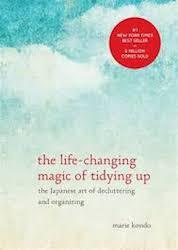
The Life Changing Magic of Tidying Up
by Marie Kondo
Take Me There!
Reader Question: What do I do if my husband checks out other women?
I get tons of reader questions about this scenario, and I really need to write about it again. I haven’t done that in a while, but here are some other posts that might help.
Also, I strongly recommend getting Covenant Eyes for your computers, tablets, phones, devices, etc. Let’s not make it easy for porn to be accessed. And when you click on the link, you’ll get 30 days free using the coupon code TLHV!

My Husband is Attracted to Other Women

Why Every Man’s Battle Backfires

Men Are Visual: Does That Mean All Men Lust?

Pastors: Enough with the “Boys Will Be Boys”
Comment: Does Divorce Hurt Kids Or Not?
I like to comment every podcast about some interaction I’ve had on social media, on the blog, wherever. And this week I got into a discussion about divorce. Someone tweeted that divorce hurts kids; someone else tweeted that staying in an abusive marriage hurts kids.
The thing is–they’re both right. Often we’ll say something, but then you have to issue the caveat–except if you’re in a bad marriage.
The problem is that we’re often aiming for the wrong thing. When we aim to preserve the marriage, we often give advice that would be the wrong thing to do in toxic marriages. The way out is to do what I’ve been talking about all week–point to Jesus instead.
Here are two posts I referenced in the podcast:

Between Two Worlds: The Inner Lives of Kids of Divorce

Why One Size Fits All Advice Never Works
That’s it for this week! I hope you take time to listen to the podcast, because I got WORKED UP. And kinda passionate.
Thanks for subscribing!
Tomorrow I hope will be the conclusion of the Love & Respect series, where I’m going to share so many of the stories that I’ve been sent this week.
Author
Social Media
Sheila's Best Posts
Books
Courses
Freebie
 Sheila Wray Gregoire has been married for 27 years and happily married for 22! She loves traveling around North America with her hubby in their RV, giving her signature "Girl Talk" about sex and marriage. And she's written 8 books. About sex and marriage. See a theme here? Plus she knits. Even in line at the grocery store.
Sheila Wray Gregoire has been married for 27 years and happily married for 22! She loves traveling around North America with her hubby in their RV, giving her signature "Girl Talk" about sex and marriage. And she's written 8 books. About sex and marriage. See a theme here? Plus she knits. Even in line at the grocery store. Find Sheila Here:
Find Sheila Here:YouTube
Sheila's Favorite Posts on To Love, Honor and Vacuum:
10 ways to initiate sex
10 Effects of Porn on Your Brain, Marriage, & Sex Life
Why So Much Marriage Advice is So Trite
How can Sex be Hot and Holy at the Same Time?
Check out some of Sheila's Books:
The Good Girl's Guide to Great Sex
31 Days to Great Sex
9 Thoughts That Can Change Your Marriage
To Love, Honor, and Vacuum
Check out Sheila's Courses:
The Boost Your Libido Course
The Whole Story: Talking to Your Daughter about Sex, Puberty, and Growing Up
The FREE Emotional Intimacy E-Course
Are you ready to take your marriage to the next level?
Sign up for our emails and get access to the TLHV free marriage and parenting resource library. We have over 25 downloads and are constantly adding more. Sign up here!
January 16, 2019
The Ultimate Flaw in the Book Love and Respect: Jesus Isn’t at the Center
This week we’ve been talking about how books like Love & Respect go so far off base.
I started with showing how the view of sex in Love & Respect is very wrong. And then yesterday I showed how the concept of a wife giving a husband unconditional respect is flawed.

How Love & Respect Gets Sex Horribly Wrong

Why Unconditional Respect Doesn’t Work
While I’ve been critiquing that book, though, I don’t think Love & Respect is the only book that goes astray. I think many books fail because they ultimately have the wrong starting premise.
I received this comment on Facebook from a woman:
I am currently separated from my husband. The goal is reconciliation, but there are a lot of things that need to change before he comes home. The part that sort of leaves me feeling sick, though, is that the first eight years of our marriage were fine. We didn’t start having real problems until he became a Christian and started reading books like this. I’m pretty sure conversion isn’t supposed to work that way.
How could this happen? How could a marriage that was good go bad when the husband became a Christian and started listening to big Christian teachers about marriage?
I think it’s because a lot of Christian teaching actually empowers men to act badly, and that’s because of that faulty premise.
Why do so many Christian marriage books (like Love and Respect) seem to make your marriage worse? They suffer from a faulty premise: Click To Tweet
So let’s step back from Love & Respect and other books for a moment and look at the big picture.
I believe that if a marriage wants to honor God, the starting point needs to be GOD. The big question we should always ask ourselves in marriage (and in life!) is “what honours God in this situation?”

Matthew 6:33
Seek first the kingdom of God, and His righteousness, and then all these things shall be added to you.
However, that’s not the starting point in many of these books. Instead, the starting point is “what does the husband want?” You see, Love & Respect (and many books like it) centre around the premise that the husband has the final say, and thus the wife must do what the husband wants, and let the husband make the decisions.
Marriage, to the wife, then becomes about following the husband, rather than following Jesus.
Many of you may balk and say, “But Sheila, the Bible does say women are to follow their husbands!”
Yes, there are a few verses that can be interpreted that way. But if we look at what the rest of the Bible says about:
following Jesus no matter what else is going on around us;
never having anything come between us and God;
obeying God, not man
then the idea that a woman should focus on what her husband wants rather than what God wants falls apart.
Similarly, if we look at all the stories in the Bible about marriage, women are often commended for going against what their husbands were doing (1 Samuel 25), or they’re punished for following their husbands (Acts 5:1-11).
When we interpret the Bible, we’re supposed to let the complete story of Scripture inform our view of certain verses, not create doctrine out of certain verses out of context from the rest of Scripture. And those who say that women must concern themselves with what their husbands want rather than what God wants ignore the wide breadth of stories from the rest of Scripture; the teaching from the rest of the Scripture about the supremacy of God; and even the verses that surround the very ones they use (they quote Ephesians 5:22 but ignore 5:21)! There are much better ways to interpret those verses that keep Christ at the centre, rather than man.
Another Way to Look at It:

Are You Following a Legalistic View of Marriage?

Many may reply: “We’re not saying follow the husband not God! God tells women to follow their husbands, so we ARE following God when we follow our husbands.”
To them I would say: You are treading on very thin ice with idolatry.
If we ever ask a wife to seek her husband’s will first rather than God’s will, then we are putting the husband in the place of God in her life. In fact, we’re actually placing our husbands above God, because we’re saying God’s will is to do our husband’s will. If God’s will is to do whatever our husbands want, then God’s will is thus subordinate to the husband’s will, something that God would never, ever allow:
“I am the LORD; that is my name! I will not yield my glory to another or my praise to idols.” (Isaiah 42:8)
Or there’s this:
Then Jesus came to them and said, “All authority in heaven and on earth has been given to me.” (Matthew 28:18)
If we ever ask a wife to follow her husband's will before she thinks about what God wants, then we're putting her husband first in her life. And that's idolatry.Click To Tweet
All authority rests in Jesus. He should be our ultimate aim (Hebrews 12:1-3; Philippians 3:12-14).
When Love & Respect asks women to defer to their husbands in everything, no matter what a husband does, then it asks women to follow a husband’s will rather than to seek out the Spirit’s will. Indeed, Emerson even tells women not to listen to that still, small voice inside them, but rather to listen to a husband’s intuition, because a woman is more easily deceived. That is unbiblical. That is wrong. That is the opposite of “seek first the kingdom of God.”
Now some may say, “Okay, Sheila, that may be true that we shouldn’t follow our husbands into sin. But in everything else, we should defer to him, because that is what we are called to do.”
To that I say, where in Ephesians does Paul tell wives there are conditions for submission?
Ephesians 5:22 does not give conditions for when a woman should submit. In fact, nowhere in the Bible does God give wives conditions for when to submit. So either the woman submits (as in, obeys and follows authority) in all situations, even sinful ones, or Eggerichs (and others) has a faulty definition of the word “submit.” I believe it’s the latter.
Submission is putting others’ needs ahead of our own. It is to be committed to the best interests of the other, and to point the other towards Christ even when it brings discomfort to ourselves. You can do that even when they are in sin, and you can do that in good times. Sometimes, that means being quiet and letting the other have his way. But in other situations it means tough love, making him face the consequences of his actions, and not enabling selfishness.
And how do we know when to do what?
When we put Jesus back at the center.
God’s aim is not our husband’s happiness; God’s aim is that all of us look more and more like Christ (Romans 8:29).
God’s aim is not our husband’s happiness; God’s aim is that all of us look more and more like Christ So wives: Always run after Jesus!Click To Tweet
When Christ was on earth, He always sought to glorify God in everything He did. And He calls us to follow in His steps—and that calling included women. We are not called to follow in Christ’s steps in every relationship except marriage. No, we are called to follow Christ everywhere, at all times, no matter what. So let’s love sacrificially as Jesus did! Let’s spur each other to love and good deeds (Hebrews 10:24). Let’s spur each other on to look like Christ.
But that is not what these books teach.
If we revisit the wet towel story from Love & Respect that I shared yesterday, does this incident in any way spur anyone on to love and good deeds? To recap, Sarah was upset because husband Emerson and their sons were slobs, and left wet towels on the bed. She kept asking them to stop, and they didn’t listen to her. She went away for a week, and when she came home, she found the family didn’t miss her because they were happier being able to be slobs without anyone stopping them. So she learned that she should stop asking them to pick up their wet towels, because she was being disrespectful.
Is anyone in that situation looking more like Jesus? Is anyone spurring anyone else on to love and good deeds? Or are Emerson and his sons just rewarded for their laziness?
What do you think it does to men to be constantly told that their wives should make them happy and do what they want?
If the man is a good, Spirit-filled man, he likely will walk humbly with God and love his wife wholeheartedly anyway. But not all men are like that. And that’s why these marriage books don’t work. If anyone other than Jesus is at the center, then it’s all too easy to create a disaster.
The stark reality is that according to the Love and Respect book, Pontius Pilate’s wife was in the wrong when she spoke up against her husband when he was condemning Jesus to death. She didn’t carefully suggest what she wanted; she didn’t speak with deference in her voice. She used commanding language and said,
“Don’t have anything to do with that innocent man, for I have suffered a great deal today in a dream because of him.” (Matthew 27:19)
Maybe the reason that verse is in Scripture is to show that women can–and do–hear God’s voice, too, and men ignore that at their peril. Being a Christian wife doesn’t mean just being quiet–it means pointing your husband to something more.
Let’s start elevating Jesus. It really is that simple. Seek after Christ. Do as Christ would. Point others to Christ.
If you do that in your marriage, then you’ll end up glorifying God. And that, ultimately, is all that matters.
That’s all I’m going to write about Love & Respect! Tomorrow on my podcast I’ll be talking about it, and on Friday I’ll be sharing many of the comments that you all have left over the last few days.
As always, I welcome your comments!
Can You Really Find PEACE in Your Marriage?
In my book 9 Thoughts That Can Change Your Marriage, I show how often the way that we THINK about marriage is actually holding us back from having a great marriage! Let's learn how to be GOOD, and not just NICE. And let's learn how to create the kind of relationship we long for:
I Want That!
Author
Social Media
Sheila's Best Posts
Books
Courses
Freebie
 Sheila Wray Gregoire has been married for 27 years and happily married for 22! She loves traveling around North America with her hubby in their RV, giving her signature "Girl Talk" about sex and marriage. And she's written 8 books. About sex and marriage. See a theme here? Plus she knits. Even in line at the grocery store.
Sheila Wray Gregoire has been married for 27 years and happily married for 22! She loves traveling around North America with her hubby in their RV, giving her signature "Girl Talk" about sex and marriage. And she's written 8 books. About sex and marriage. See a theme here? Plus she knits. Even in line at the grocery store. Find Sheila Here:
Find Sheila Here:YouTube
Sheila's Favorite Posts on To Love, Honor and Vacuum:
10 ways to initiate sex
10 Effects of Porn on Your Brain, Marriage, & Sex Life
Why So Much Marriage Advice is So Trite
How can Sex be Hot and Holy at the Same Time?
Check out some of Sheila's Books:
The Good Girl's Guide to Great Sex
31 Days to Great Sex
9 Thoughts That Can Change Your Marriage
To Love, Honor, and Vacuum
Check out Sheila's Courses:
The Boost Your Libido Course
The Whole Story: Talking to Your Daughter about Sex, Puberty, and Growing Up
The FREE Emotional Intimacy E-Course
Are you ready to take your marriage to the next level?
Sign up for our emails and get access to the TLHV free marriage and parenting resource library. We have over 25 downloads and are constantly adding more. Sign up here!
January 15, 2019
Love and Respect: Why Unconditional Respect Can’t Work
Should you have unconditional respect for your husband, as Emerson Eggerichs claims in the book Love & Respect?
I was overwhelmed by the response to my review of Love & Respect’s sex chapter yesterday. Many of you asked for my take on the whole book, and not just the sex chapter. So that’s what I’d like to give today.
You know, the super embarrassing thing is that I actually gave this book a 4-star review on Goodreads a few years ago. Didn’t even remember that, except a commenter mentioned it yesterday (I changed the review). I did skim the book when it first came out, and to be honest, I assumed it was good. It was a best seller; it was put out by Focus on the Family. It was sent to me in a huge package of books when I started speaking at marriage conferences. I trusted the Christian publishers. I trusted the conferences. But now I realize that we all need to use a little more discernment. So let’s do that today.
As I looked at the book anew, the subtitle on the cover itself jolted me: The Love She Most Desires, the Respect He Desperately Needs.
It’s saying that men need respect–desperately–whereas women merely desire love. Whether intended or not, right from the start, the man’s interests in marriage are elevated over the woman’s. This continues into how Eggerichs frames the book (from the first paragraph):
Even though the book is written for couples, Eggerichs explicitly states that the aim of the book is to teach the wife to change to respect her husband so that her husband will love her. Changing her behavior is his focus.
I have much I could say about how we should never act one way in marriage for the purpose of getting someone to do something else. That’s manipulation, and it’s wrong. I could also comment on his premise that women only really need love and men only really need respect. But I don’t have room to address everything today, so I’d like to focus just on the idea that women should be giving men unconditional respect.
In the bestselling Christian marriage book Love and Respect, we're told men need unconditional respect and women need unconditional love. But what does unconditional respect look like? Let's see: Click To TweetAgain, I do know that many people have read this book and found it helpful. Likely it reminded them that they should be thinking about what their spouse needed, and stop being so selfish. That’s always a good thing to learn. However, there are enough underlying problems with the book that I’d like people to reconsider it. While I already talked about my problems with how Love & Respect portrays sex, I’m also troubled by its take on respect.
How does Eggerichs define respect?
He doesn’t, actually. In the whole book, he never gives any succinct definition of respect. So let’s build up a definition using the illustrations and teachings that Love & Respect gives.
First, Eggerichs teaches that respect in marriage means allowing him to make the decisions.
He says love and respect are not the same thing; you respect your boss, for instance, but you don’t love your boss. (68). So the way we treat our boss is analagous to the way we should treat our husbands–we should do what they say.
Though he never defines respect, he does tell us what respect feels like to a husband. To do so, Love & Respect uses the acronym CHAIRS:
Conquest (appreciate his need to work and achieve)
Hierarchy (appreciate his desire to protect and provide
Authority (appreciate his desire to serve and to lead)
Insight (appreciate his desire to analyze and counsel
Relationship (appreciate his desire for shoulder-to-shoulder friendship)
Sexuality (appreciate his desire for sexual intimacy)
A big part of respect, then, is recognizing that your husband is in authority over you.
“How should a wife act if she strongly disagrees with her husband about some issue? 1 Timothy 2:12 has some advice. Paul writes, “I do not allow a woman to exercise authority over a man but to remain quiet.” (220)
You must allow him to make decisions and trust his intuition, rather than your own. Indeed, we have to do this for our own good, because women are far more easily deceived than men. The Serpent deceived Eve, and then Eve went and got Adam and gave him the fruit. (230).
Eggerichs completely misrepresented the Genesis story here, by the way, since the Bible clearly says that Adam was with Eve the whole time:
She also gave some to her husband, who was with her, and he ate it. (Genesis 3:6).
But nevertheless, Eggerichs feels that husbands are uniquely called to be responsible for the family, and thus we must allow them to make the decisions and defer to them, especially since we cannot trust ourselves.
Another Way to Look at It:

What Does It Mean to Obey Like Sarah?

Second, you respect your husband by giving them sexual release.
I talked about Love & Respect’s take on sex yesterday at great length. Men need physical release. They experience this as respect. If you don’t give it to them, they will be tempted to have affairs or to ogle other women.
Third, you respect someone by being quiet–no matter what
How you speak to your husband determines whether you are being respectful or not.
Look at these dichotomies Love & Respect sets up (these are just a few; throughout the book women are warned not to nag, scold, belittle, criticize, etc.):
“If you’re in a conflict and you remain respectful and quiet as you distance yourself a bit instead of preaching, lecturing or criticizing, what will he do?” (70)
“She can try to make personal adjustments and treat her husband respectfully according to what Scripture says, or she can continue with a sour look and a negative, disrespectful attitude.” (88)
So she’s either:
preaching, lecturing, criticizing, giving a sour look, or having a negative attitude; or she’s
treating her husband respectfully and remaining respectful and quiet.
Those are our only two options. And he uses expressions like “remaining respectful” or “speaking respectfully” throughout the book, over and over again, without ever explicitly explaining what they mean, as if that were just self-evident.
Now, maybe part of speaking respectfully is standing firm for what’s right, or refusing to enable sin, or expressing your concerns if you think he’s wrong. The only way we can know is to look at some stories and see what he instructs women to actually say. So let’s do that.
In the Appendix, Eggerichs helps a woman who is married to a workaholic deal with his hours away from home.
To influence him directly, respectfully say, “Your son (daughter, children) needs you at home more. You have a unique influence on him. In certain areas, nobody matters to him as much as you do. It may not appear that way to you, but your positive presence has the power to mold him. I know you are swamped and have little time, but I also know that you want to give him that part of you that no one else can give to him. Thanks.”
After delivering your “we need you at home more” message, don’t repeat it for anywhere from ten to twenty days. Then mention it again, quietly and positively with the general tone of “just a positive reminder because of your importance”….
Quietness shouts loudly. (316)
So in the Love & Respect world, “speaking respectfully” means that you may very briefly state what you want, but you must then be quiet for several weeks before you can repeat anything like that again. And speaking a few sentences every few weeks are the only tools you have at your disposal to address your husband’s issues.
How to Ask Your Husband for Help:

When Your Spouse Refuses to Talk about Important Things

10 Ways to Talk so Your Husband Can Hear You
Fourth, you respect your husband by allowing him to do what he wants in your house.
There are instances when a woman may want something that is perfectly reasonable–something that, if a husband and children listened to her, would cause them to be less selfish, better people–something like not being slobs.
But in this case, it is better for a wife to continue to let her husband and sons be selfish than it is for her to allow them to “reap what they sow” and speak up about their selfishness and/or laziness.
We know this from Emerson Eggerichs’ own marriage, and I’m going to quote this story at length because it needs it. Speaking about his wife Sarah, Eggerichs writes:
As Sarah will readily admit, she recalls this time of tension between us and realizes that she had grown very negative, trying to change everyone to conform to her standards, particularly of neatness. She complained about every crumb on the counter, every shoe on the floor, every wet towel left on a bed, every candy wrapper that missed the wastebasket. She was trying to help all of us, especially me and my two sons, to realize we would be happier if we were neater and more organized. Frankly, it wasn’t working too well. (emphasis mine)
It so happened that Sarah decided to take a trip to another city to see her mother, and she took along our daughter, Joy. I stayed home with our two sons, Jonathan and David. A week went by, and Sarah and Joy returned from their trip. When I picked them up at the airport, her first question was, “Well, how was your time?”
I replied, “Oh, it was good.”
“Did you miss me?” she wanted to know.
I couldn’t lie, so I said, “You know, we had a wonderful time. We just ate where we wanted to eat. We made forts when we wanted to make forts. We made the beds when we wanted to make the beds.”
Sarah got my message. She realized that we had made the beds for the first time that week just before coming to the airport. And she also realized that we hadn’t really missed her that much. Oh, we still loved her as wife and mother, but we hadn’t missed all the badgering and criticizing.
Right there Sarah made a choice that she would like me and our sons despite our sloppiness. (pages 242-243)
I am so overwhelmed by how horrid this story is that I barely have words. Eggerichs pays lip service to how husbands should love their wives, but here’s a perfect example of how he withholds love simply because she speaks up about not wanting wet towels on the bed.
The resolution to this issue? Once again, as it is with the vast majority of illustrations in the book, the wife decides to do what the husband wants, and stops wanting or expecting anything else.
Now, if he were using this illustration to say, “her tone was off and was very disrespectful, so once she spoke differently I felt respected, so I listened to her and instructed my boys to as well” that would be one thing. But the resolution here is not that she spoke in a different tone; it’s that she stopped speaking or asking for anything at all.
I don’t know this couple personally, and I can’t comment on their particular marriage. But I will say this: withholding love when your spouse makes reasonable requests of you, and then stating that making any reasonable request is a sign that you are disrespectful and thus means that you are being disobedient to God, is classic emotional abuse with a spiritual component. He is not describing a healthy marriage; he is describing an emotionally abusive one, and I don’t use that term lightly. This illustration is used as an example of HER disrespect. To me, when I read that story, all I can see is the husband’s blatant disrespect of the wife, and the husband empowering the sons to disrespect her as well. Indeed, her husband isn’t even supporting Sarah in trying to teach her sons crucial life skills! My son-in-law Connor’s response to this story was to say:
I feel so much sympathy for those kids, because twenty years later, they’re going to grow into the kind of men we won’t have sympathy for.
This example, along with many, many more, give the impression that if a wife ever speaks up about something that she doesn’t like her husband doing, she is being disrespectful and is thus going against God, no matter how in the right she is (wet towels on the bed are seriously horrible, people). In the Love & Respect world, a woman’s opinion, feelings, or even well-being no longer matter.
In Love and Respect, anecdotes are given of women making reasonable requests (like not leaving wet towels on the bed) and then being framed as disrespectful and disobedient to God. This is an example of emotional abuse, not a healthy relationship.Click To Tweet
Finally, this respect must be unconditional–even if the husband is doing something really wrong.
“This is not about the husband deserving respect; it is about the wife being willing to treat her husband respectfully without conditions.” (18, emphasis mine)
“Obviously, wives can go on “winning the battles” by attacking, criticizing, or lecturing husbands who are drinking, straying, or whatever their problems may be, but they will eventually lose the war.” (88, emphasis mine)
So whether our husbands are having affairs or drinking excessively, we must always be quiet and respectful. He does say in some places that you don’t need to defer to a husband who sins terribly against you, but then he throws in lines like this which show that even in the case of adultery, we’re supposed to have unconditional respect. So his disclaimers ring hollow.
He uses the example of an abusive spouse to drill this lesson in:
Another wife who had suffered physical and verbal abuse from her husband (which I absolutely condemn as wicked and urge a wife to seek protection and help for) and had gone back to him after he repented, realized she had not completely forgiven him and certainly wasn’t showing him respect. After coming across our materials, she began showing him respect, mostly by remaining quiet and dignified instead of arguing. (278)
Now, anyone who knows anything about abuse knows that “repentance” is part of the abuse cycle and means nothing, in and of itself. A guy is abusive; he gets called on it and she sets up boundaries; then he apologizes, love bombs her, and convinces others that he never meant it and that he’s changed. So the relationship is restored, and he can now begin abusing her again.
This happens over and over again, until she finally says, “no more!”, or until she at least says “you must show me that you are safe by seeking counselling, taking responsibility for your actions, and acting appropriately for a very long time before we can consider resuming a relationship.” After there has been abuse, a man must show that he is trustworthy through his actions, not just his words. And this should be demonstrated over an extended period of time.
But that’s not what Eggerichs portrays. Instead, Eggerichs approvingly reports that the man repented and he’s back home!
Then the relationship improves–not because he stops abusing her, but because she stops reacting to his anger. She was to blame for the conflict in their marriage after all.
Churches: Before you run another series on Love & Respect, can you look at what the book actually says? Is this really the model of marriage you think is healthy? Click To Tweet
Unconditional respect doesn’t help a relationship; it hurts a relationship.
Some situations do not need for us to be “quiet”. They need us to pick up a whip of cords and turn over some money changers’ tables! But Eggerichs includes nothing from Ecclesiastes 3 about how there are times to speak up. He includes nothing from Proverbs about how to deal with fools or someone who is acting badly. It is as if he believes all of the advice in the Bible about how to handle those who are doing wrong does not matter if the person doing wrong is your husband.
In the book Love and Respect, it as if all of the advice in the Bible about how to handle someone who is doing wrong against you doesn't apply if the person doing wrong is your husband. Click To TweetAnd I find that highly problematic.
While unconditional love can involve standing up to these types of behaviours and enacting boundaries, unconditional respect, in Eggerichs’ conception of respect, cannot. I explained this problem in another post I wrote:

From 10 Signs You're Respecting Your Husband Too Much:
While you can unconditionally love someone but still offer “tough love”, there’s no equivalent for “tough respect”.
For instance, if your drug addicted sister comes to you and asks for $500, it’s showing her love to refuse. But how do you offer respect to someone addicted to porn, or with anger management issues? I’ve argued that respect cannot mean respecting what they do, but rather respecting their right to make their own choices, free of manipulation from you. However, that also means that you have a right to make your own choices in return.
Eggerichs, though, never gives women any of these choices–any room to draw any boundaries or stand up for what’s right.
A Better Way to Honour God in Your Marriage:

Are You a Spouse or an Enabler?

When Your Husband Won’t Change: Is this the Last Straw?

4 Things You Must Do If Your Husband Uses Porn

10 Signs You’re Respecting Your Husband Too Much
Instead, taken together, here’s how I would describe the Love & Respect model of a respectful wife:
She honors her husband’s authority in the marriage, allowing him to make the decisions. She does not speak up when she disagrees with him, even if he is being selfish and seriously burdening her. When he is doing something really wrong that hurts the family and children, she remains quiet and speaks only briefly. She may mention what she is upset about once, but then she does not bring it up again for several weeks. This is true even in cases where he is a workaholic; drinking too much; or having an affair. If he is angry or abusive, she is respectful by not speaking up when he has angry outbursts, but instead by remaining quiet. No matter what, in all of these cases, she regularly gives him sexual release, without any regard for her own feelings, understanding that this is a need that he has, and that he cannot show her love without it.
Everything in this book shows women how to make sure they’re doing what their husbands want. And that, apparently, is how we please Jesus–by doing whatever our husbands want.
There is so much more I want to say, but perhaps I’ll just leave it at that, and come back tomorrow to talk about the real underlying flaw in marriage books like Love & Respect.
I’m seriously emotionally exhausted after reading all of this over the last few days and then writing it up. I look forward to your comments.
I’ve received hundreds of comments over the last week about the harm Love & Respect did to people’s marriages.
I was going to post a whole bunch of them, but here’s just one, which I hope is helpful because it shows how a different way of seeing marriage actually helped.
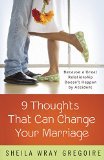
Facebook Comment About 9 Thoughts That Can Change Your Marriage
Love & Respect was gifted to us as a wedding present by some elders in our church that we still love to this day. Our relationship was bad from the start, but I truly believed it was because I wasn’t dealing with situations right. I thought I just didn’t know how to speak his language. I finally picked up the book, and tried to work through it. It kept getting worse, and I kept thinking it was because the enemy was just fighting our marriage. My husband would get so angry and would be so relentless with his fighting, and as soon as I cried (like bawling my eyes eyes, yelling crying) he would finally stop. But it was like there was a release in him, a kind of peace that could only occur if I finally cried.
I couldn’t make it through the book. I even tried a different set of books by Emerson’s wife, but I never could make it through. Over and over and over I thought it was ME doing something wrong. If I just did this or did that or could speak a certain way, it could change everything.
I FINALLY heard God say to work on myself. I heard it before, but misinterpreted it to mean work on my part in the marriage. No, He meant literally don’t even think of my husband, work on me and my health and my relationship with Him. So I tried, but since I still had to deal with my husband every day, it was monumentally difficult.
I don’t remember how, but I finally found Sheila’s 9 Thoughts That Can Change Your Marriage, and Thought 5 just brought everything into clear, sharp focus. In that moment I was released from every ounce of guilt I’d built up over the years. I thought my marriage falling apart was my fault, I just couldn’t find the right combination of things. All the times I spent standing up for myself and my kids WEREN’T wrong. They were RIGHT. And the problem was my husband’s!
I won’t pretend I now believe I was perfect or above reproach. There are always things that can be better. But I can now see my HEART was always in the right place. I am not a typical abused wife. I never “submitted” to his abuse nor did I ever just let it happen. I stood my ground every time and put myself in between him and the kids whenever he got out of hand (he was not physical, but was angry and verbal and physically imposing). But I ALWAYS felt guilty afterwards. I beat myself up for not responding more kindly or respectfully. But I could not figure out how to be kind and respectful in those situations. The ideas in this book kept me in an unhealthy spiral for years. Sheila’s book set me free. It set off the most amazing journey over this last year. It’s the hardest thing I’ve ever been through, but it’s the most amazing thing I’ve ever been through. THANK YOU!!
If you want a healthier way to act respectfully and lovingly in marriage, please see 9 Thoughts That Can Change Your Marriage instead.
Author
Social Media
Sheila's Best Posts
Books
Courses
Freebie
 Sheila Wray Gregoire has been married for 27 years and happily married for 22! She loves traveling around North America with her hubby in their RV, giving her signature "Girl Talk" about sex and marriage. And she's written 8 books. About sex and marriage. See a theme here? Plus she knits. Even in line at the grocery store.
Sheila Wray Gregoire has been married for 27 years and happily married for 22! She loves traveling around North America with her hubby in their RV, giving her signature "Girl Talk" about sex and marriage. And she's written 8 books. About sex and marriage. See a theme here? Plus she knits. Even in line at the grocery store. Find Sheila Here:
Find Sheila Here:YouTube
Sheila's Favorite Posts on To Love, Honor and Vacuum:
10 ways to initiate sex
10 Effects of Porn on Your Brain, Marriage, & Sex Life
Why So Much Marriage Advice is So Trite
How can Sex be Hot and Holy at the Same Time?
Check out some of Sheila's Books:
The Good Girl's Guide to Great Sex
31 Days to Great Sex
9 Thoughts That Can Change Your Marriage
To Love, Honor, and Vacuum
Check out Sheila's Courses:
The Boost Your Libido Course
The Whole Story: Talking to Your Daughter about Sex, Puberty, and Growing Up
The FREE Emotional Intimacy E-Course
Are you ready to take your marriage to the next level?
Sign up for our emails and get access to the TLHV free marriage and parenting resource library. We have over 25 downloads and are constantly adding more. Sign up here!
January 14, 2019
A Review of Love and Respect: How the Book Gets Sex Horribly Wrong
What happens when a bestselling Christian marriage book, like Love and Respect, treats sex as if it’s just for the husband?
Sometimes I get overwhelmed by the emails and comments on this blog from desperate people. I’ve been trying to address these things on a case by case basis, writing posts about very specific marriage issues.
But when the same things keep popping up, time and time again, I start to ask myself: “How can I address the root cause?”
A few months ago, I started wondering if maybe the reason that so many of the same issues kept recurring was because the Christian teaching in a particular area was faulty. So I thought I would review some popular Christian books on marriage for couples to see what they say about sex. And I thought I’d start with a review of the book Love and Respect, by Emerson Eggerichs, since it’s consistently one of the best-selling Christian marriage books. I’d never actually read it all the way through before, but I thought it was time to take a look.
There’s a lot that I could say about how Love & Respect approaches marriage.
His premise is that women desire love, but men desperately need respect. And both must be unconditional.
I know that many people have read this book and found it very helpful in their marriage. I do believe that if you are in a good marriage, with two well-meaning people, the main message you’ll take away is “don’t be selfish”, which is beneficial. I think that’s why so many people like the book, and have gleaned a lot from it. But if one partner is not well-meaning, the advice can make the marriage worse. Beyond that, the underlying premise of a book can change our expectations and our conversations about marriage, even if it doesn’t hurt our marriage in particular.
And that latter part is what I want to review: How has Love & Respect shaped our conversations about sex?
I’d be happy to review Love and Respect more broadly if people want me to (just leave that request in the comments), but I really want to focus on the teaching about sexuality that is found in the book, since that is the cornerstone of what I write about. So let’s dive in:
In Love and Respect, sex is only given its own chapter in the section covering husbands’ needs
Eggerichs divides his book up into two main sections:
What love looks like for women, and what women need;
and what respect looks like for men, and what men need.
In the section of the book that talks about women’s needs, sex is never mentioned as a need (helping her feel good during sex is never mentioned as a need, either). Sex tends to be mentioned as an afterthought in chapters about other things that women need, such as this quote from the Openness Chapter:
“When she believes there is a problem, when she feels hurt, lonely, or neglected, she definitely has no interest in responding to you sexually.” (p. 137)
And then there’s this:
You must not be open [emotionally] to “get sex”. A wife sees through that and is turned off sexually. But when you authentically meet her emotional needs, she’ll be empathetic to your sexual needs.” (p. 144)
Sex is portrayed as something that men will get from empathetic wives if they meet her other needs, and not as something that women may want or enjoy, in their own right.
Here’s what Eggerichs’ Love and Respect Includes in the Sexuality Chapter
When Emerson Eggerichs does explicitly address sex, it’s in the wife’s section of the book on how she can meet her husband’s needs. I don’t want to be accused of taking him out of context, so I’ve written a synopsis of this chapter. However, it’s quite long, so I’ll put it in a box that you can open if you’re interested. For brevity’s sake, though, I’ll summarize:
A Synopsis of the Sexuality Chapter from Love and Respect
Page 250: He can’t respond to emotional needs until he has physical release
The chapter opens with an anecdote about a couple where she wouldn’t respond sexually until he met her emotional needs, but he was withdrawing. So God asked the wife,
“Who is supposed to be the mature one here? He is a new believer and you’ve been in Christ for many years.”….She decided to minister to her husband sexually, not because she particularly wanted to, but because she wanted to do it as unto Jesus Christ. She just didn’t have that need for sex….
As the wife met his need for sex, he became very affectionate.
“Sex for him and affection for you is a two-way street. Just as he should minister to your spirit to have access to your body, so, too, you should minister to his body if you want to gain access to his spirit.”
Page 250: Sex is symbolic of his deeper need–respect
“A husband has a need for physical release through sexual intimacy.” (250)
Page 251: The Two Keys of Understanding Your Husband’s Sexuality
His sexuality is different from yours, because he is visually stimulated.
“He needs sexual release just as you need emotional release.”
Page 252-255: Husbands…can come under satanic attack when deprived of sexual release.” (252)
The section opens with a story about a daughter explaining to her mother that she and her husband are having a fight, and the mother telling the daughter that she should have more sex with him, saying, “Why would you deprive him of something that takes such a short amount of time and makes him sooooo happy!?” (252)
His anatomy and design is much different from yours. “He needs sexual release as you need emotional release.” (253)
What if he doesn’t get it? “The cold, hard truth is that men are often lured into affairs because they are sexually deprived at home.” (253)
The chapter then goes into several stories about affairs that were started because a man lacked sex. “A man who strays is usually given total blame for his affair, but in many cases he is the victim of temptation that his wife helped bring upon him.” (253) A story about how a wife realized that she was to blame for her husband’s affair follows. She had been so busy with kids that she had left her husband vulnerable to attack from the enemy. She recounts:
“His need for this was so strong that at one point during our separation, he was willing to give up everything—marriage, family, business, reputation, even his relationship with the Lord–just to continue feeling the respect and admiration he was feeling from this other woman…God is helping me see my part in the breakdown of our marriage.” (254)
A final story of an affair, this time one that didn’t end on a happy note, because the wife did not realize that she was responsible for him being tempted. The husband writes (and Eggerichs quotes him approvingly):
“I don’t blame her for [my] immorality, but she doesn’t own up to anything. I’m not blaming her, but she is not blameless.” (255)
Pages 256-258: Men Are Tempted By Other Women, and Need their Wives to Understand
Men need to be able to talk to their wives about their temptations with other women’s bodies. Women need to accept that husbands will be tempted by other women, and not be hurt if a husband shares this. If a woman can share her deepest issues, then men need to be able to share their deepest issues. If a husband should empathize with a woman struggling with body image issues, then a wife should also empathize with a husband being tempted by other women. (256)
Because she gets upset if she hears that he is tempted by other women, and tells him that he needs to stop looking at other women, he will clam up and will not be able to be open with her anymore. (256)
God understands that men are visually stimulated; women need to understand that husbands are, too, and that they will notice other women and struggle with that temptation. (257)
“Simply put, a man is responsive to what he sees. He needs his wife’s understanding of his struggles.” (257)
“A wife longs to receive her husband’s closeness, openness, and understanding. You can achieve this in two ways: (1) do your best to give him the sexual release he needs, even if on some occasions you aren’t “in the mood,” or (2) let him know you are trying to comprehend that he is tempted sexually in ways you don’t understand.” (257)
“If your husband is typical, he has a need you don’t have. When you shame him, punish him, or deprive him, he feels dishonored for who he is. If your husband feels you do not respect his struggle, his desire for you, and his maleness, he’ll pull back from you.” (258)
The book talks about sex on pages 250-258.
Page 250: He can’t respond to emotional needs until he has physical release
It opens with an anecdote about a couple where she wouldn’t respond sexually until he met her emotional needs, but he was withdrawing. So God asked the wife,
“Who is supposed to be the mature one here? He is a new believer and you’ve been in Christ for many years.”….She decided to minister to her husband sexually, not because she particularly wanted to, but because she wanted to do it as unto Jesus Christ. She just didn’t have that need for sex….
Page 250: Sex is symbolic of his deeper need–respect
“A husband has a need for physical release through sexual intimacy.” (250)
Page 251: The Two Keys of Understanding Your Husband’s Sexuality
His sexuality is different from yours, because he is visually stimulated.
“He needs sexual release just as you need emotional release.”
Page 252-255: “Husbands…can come under satanic attack when deprived of sexual release.” (252)
This section includes several stories about how women’s lack of sex led men into affairs: “The cold, hard truth is that men are often lured into affairs because they are sexually deprived at home.”
Pages 256-258: Men Are Tempted By Other Women, and Need their Wives to Understand
Men need to be able to talk to their wives about their temptations with other women’s bodies. Women need to accept that husbands will be tempted by other women, and not be hurt if a husband shares this. If a woman can share her deepest issues, then men need to be able to share their deepest issues. If a husband should empathize with a woman struggling with body image issues, then a wife should also empathize with a husband being tempted by other women. (256)
“If your husband is typical, he has a need you don’t have. When you shame him, punish him, or deprive him, he feels dishonored for who he is. If your husband feels you do not respect his struggle, his desire for you, and his maleness, he’ll pull back from you.” (258)
That’s a very quick synopsis, but you can see by the page numbers how much space is devoted to each topic.
To read the total synopsis, click the box above.
No author can say everything they want to about sex in just one chapter. When they only have a little bit of space, then, what they do choose to say is indicative of what they consider to be the most important lessons. If people hear nothing else–then let them hear this. If I were to summarize Love & Respect on the topic of sex quickly, then, here’s the information Eggerichs appears to feel is most important:
A husband has a need for physical release. A woman does not have a need for sex; her need is only for emotional connection, which she won’t get unless she gives him sex. Men experience respect through their wives giving them physical release. If wives don’t meet their needs, husbands will be tempted to have an affair, and affairs tend to be caused by women not having sex. Men are visual and will be tempted by other women; when we don’t allow a husband to confess that he finds other women attractive, he will clam up and will cut himself off from us emotionally.
My response to the Love & Respect sexuality chapter:
I have much I’ll say below about what Eggerichs omits from the book–and about how he portrays women’s sex drives. And I do agree that when we make love, we tend to become more affectionate towards one another (that’s the hormonal effect of oxytocin). But I want to comment here on the overarching theme that men will stray and be tempted if they don’t get physical release.
When Christian teachers repeatedly and consistently say that all men lust and that temptation is normal, this paves the way for dysfunctional marriages and normalizes sexual sin.
When Christian teachers repeatedly and consistently say that all men lust and that temptation is normal, this paves the way for dysfunctional marriages and normalizes sexual sin.Click To Tweet
When a young woman who is seeped in this teaching is dating a guy who is checking out other women in public, watching porn, and trying to pressure her into having sex, she won’t necessarily see these things as red flags. Since this teaching is so rampant, she assumes that all Christian men treat women as commodities. And she doesn’t think that she deserves more, because she doesn’t realize that more even exists.
I have written at length about how the idea that “every man lusts” hurts marriages, traps men in a sin cycle, and is faulty theology. I won’t repeat it all, but you can see some of these posts:

Pastors: Enough with the “Boys Will Be Boys”

Why Every Man’s Battle Backfires

Men Are Visual: Does That Mean All Men Lust?

Can We Talk About Men’s Sexual Needs in a Healthy Way?
Here’s what Eggerichs’ Love and Respect Does Not Include in its Sexuality Chapter
Love and Respect never once includes anything about sex being pleasurable for a woman.
Eggerichs frames sex as about the husband’s “physical release”–his orgasm–but he never mentions that women can (and should!) have orgasms, too. When one of the number one Christian marriage books completely ignores the fact that women are supposed to experience sexual pleasure, I find that concerning.
It's concerning that one of the most popular Christian marriage books frames sex as being about a husband's need for physical release, and never once mentions that sex should be pleasurable for the woman, too. Click To Tweet
I had a man leave a comment recently about how his wife was in rebellion because she would never give him sex–and it’s not like it took very long! It was just five minutes of her day, and she was rejecting Christ by rejecting him.
This reasoning is consistent with what Eggerichs teaches (he even uses an anecdote about sex not taking very long, so what’s the big deal? Just do it! p. 252). But sex should take longer than five minutes! If sex has never taken longer than five minutes, then it’s quite clear that the husband is only concerned about his own physical release (exactly what Eggerichs says the purpose of sex is) and he’s never realized that he’s supposed to make sure she enjoys herself, too.
I spoke to a woman at a FamilyLife marriage conference once who wanted to understand why she never desired sex. She’d been married for 23 years, and this was the biggest thing they disagreed about. But she just couldn’t get excited about sex. The more I asked questions, the more I understood the issue: Her husband never lasted longer than three minutes, either. But they had no idea this was not ideal. They had heard teaching for years about how women needed to give sex, but never any teaching on a woman’s sexual response.
Her sexual pleasure matters, too! So I told her about 31 Days to Great Sex, and asked her to work through it slowly with her husband so that they could discover what made her feel good as well.

Why Women’s Sexual Pleasure Matters

Love & Respect explicitly says that women do not have needs for sex. It also never mentions that women’s sexual pleasure should be part of a healthy sexual relationship. It erases women’s sexual being, turning them simply into vehicles for a man’s physical release. If women’s sexuality is erased, is it any wonder that women’s libido is as well?
Love and Respect explicitly says that women do not have needs for sex. It erases women's sexual being, turning them simply into vehicles for a man's physical release. If women's sexuality is erased, is it any wonder that women's libido is as well?Click To Tweet
Love and Respect never includes anything about sex being about a deep spiritual and emotional intimacy and a deep knowing of each other.
The starting point for many Christian teachers is that sex is about the husband. You see it here in Love & Respect blatantly, where we’re told that sex is about his physical release. It is something a husband alone needs, and something that a wife must provide. Mark Driscoll, in the same vein, called women “penis homes”. I commented on this type of thinking in these posts:

Are We Making Sex Just About His Physical Release?

When Christians Make It Sound Like Sex is For Him
God does not present sex like this at all. God sees sex not as transactional where the husband gets what he needs, but as a mutual experience of a deep “knowing”, a Hebrew word that encompasses a deep emotional and spiritual intimacy as well. And here’s how I described intimacy in my book The Good Girl’s Guide to Great Sex:

From The Good Girl's Guide to Great Sex:
Sex is ultimately a longing, a passion, a deep desire for connection. God created in each of us this longing for intimate connection with him, and he put that same longing in us for each other to mirror how he feels about us. (p. 33)
When we’re vulnerable with our mates, we feel a deep sense of connection…And that connection is very powerful. It’s that urgency to devour your husband, to consume him, to be consumed by him, just so that you can feel even more connected. (p. 163)
That’s what sex is supposed to be–not just sex, but truly making love.
But Eggerichs does not even talk about “making love” (that phrase is never used in this chapter). Yes, he does say “sexual intimacy” a few times, but that’s only ever paired with the idea that the man needs physical release or he’ll be tempted. You can’t call it intimacy if it only involves one person’s pleasure and is motivated by the other person’s fear of rejection.
When Christian teachers frame sex as being about a husband’s physical release so that he’s not tempted to watch porn or to stray, we treat wives like the methadone treatment for their husband’s sex addictions.
When Christian teachers frame sex as being about a husband's physical release so that he's not tempted to watch porn or to stray, we treat wives like the methadone treatment for their husband's sex addictions.Click To Tweet
I sometimes wonder if those who teach such things have any idea what this teaching does to a woman’s heart–a woman who wants so desperately to be truly intimate with her husband, to be truly respected, and to be truly cherished. If sex is reduced to his physical release, then he is using her body while ignoring her soul. That’s erasing her very personhood.
Love and Respect never addresses the 25% of marriages where the wife has the higher sex drive.
So many women on my blog are desperate because their husbands never want sex. In my surveys for The Good Girl’s Guide to Great Sex, I found that 24% of women had higher sex drives than their husbands. If they read this book (and others) and listen to Christian teachers who talk only about a man’s need for sex, and a woman’s obligation to give it–well, how are they going to feel?

10 Things Higher Sex Drive Wives Need to Know

Why Doesn’t My Husband Want to Make Love?
Love and Respect never talks about how pornography is ravaging men’s sex drives (and women’s!) and how this must be dealt with before just “having sex”
Sex cannot be intimate if a man is using a woman after being aroused by images of other women. That is the antithesis of intimacy.
Yet if sex is only about men’s “physical release”, then none of this matters. That’s a recipe for an extremely unhealthy, and even sexually abusive, marriage.
I have written at length about how porn use rewires the brain so that what becomes arousing is an image or a video, rather than a relationship. Delve too much into porn, and it becomes more and more difficult to be aroused by your wife. Men who use porn often also “use” their wives in bed. They tend to be selfish and can be rough; they demand things that the wife doesn’t want to do that she considers gross; they don’t think of sex as being about love, but as being about him taking what he wants. This is extremely unhealthy–for the marriage; for the wife’s heart; but also for the husband’s soul.
If a woman were married to a guy addicted to porn, and she read Love & Respect, what would she hear?
His porn use is her fault, because the reason that guys stray is because their wives aren’t giving them sex (specifically physical release). This is demonstrably false. Most husbands who use porn got hooked before they married. In addition, most men with porn habits lose interest in their wives. In most marriages to porn users, the problem is not that he wants sex and she isn’t giving it, so he turns to porn. The problem is that he is never interested in her, because he watches porn and masturbates all the time.
Yet reading this book, she would be given no advice on how she should address his porn issue except “have more sex so he won’t stray“, which is actually exactly the OPPOSITE of what should be done to help him defeat this–and ridiculous anyway, because male porn users don’t tend to be interested in sex with their wives.

4 Things You Must Do if Your Husband Uses Porn

10 Things to Know About How Porn Affects Your Sex Life and Marriage
Love and Respect never talks about how a woman might have a good reason for not wanting sex right now.
Leaving out any legitimate reasons why a woman may want to say no actually fits with the Love & Respect approach, because if sex is only about his physical release, and not about them feeling intimate, then her feelings are completely irrelevant. So whether she is feeling pukey from pregnancy; grieving from a recent loss; pain from physical ailments (or sexual pain); or even just plain exhausted–none of that matters, because of his overarching need for respect, which he experiences as her giving him physical release. And because they’re needs, they supersede what she wants.
Indeed, Eggerichs frames sexual release as a desperate need that she will never understand. And if it’s a need like that, then she could not possibly have a good reason to say no. Eggerichs repeats this “need” sentiment several times in Love & Respect:
[H]e has a need you don’t have. (258)
He needs sex; she doesn’t. If that’s true, then it’s setting up the expectation that whenever they have sex, he will want to, but she won’t. She’s really doing it just for him. That’s explicitly what Eggerichs says, too:
She decided to minister to her husband sexually, not because she particularly wanted to, but because she wanted to do it as unto Jesus Christ. (250)
Women then grow up believing that the norm in marriage is having sex when you don’t want to. No wonder so many women struggle with the idea of consent! This mindset is the reason I had to write this post on how there can actually be rape in marriage.
Incidentally, if at least 1/4 of women are victims of sexual assault or abuse, and even more are victims of unwanted sexual attention, how do you think framing sex as something that she will never really want, but she must give to him anyway, makes her feel about marriage?
On this blog, I do indeed talk about how women should have sex more frequently. I do believe that sex should be a frequent and intrinsic part of marriage. But I do it in terms of “what can we do to help you boost your libido and reclaim the sex drive God gave you”, not in terms of “you’re obligated to have sex for your husband’s sake.” That difference matters. One honours women and how God made us; one erases us.
I try so hard on this blog to give both sides of the equation–how men need to woo their wives and make sex feel good, but how women need to be enthusiastic about sex, too.
I do believe that, in general, men make love to feel loved, whereas women need to feel loved in order to make love.
I do believe that the sexes in general terms approach sex differently, because this has been well-documented in scientific studies. I have been encouraging women for years to have more sex with their husbands–and here are just a few posts to show it!

Why Your Enthusiasm Matters to Your Husband

Do We Understand What Rejection Does to Husbands?

Is Your Husband a Lone Wildebeest?

Are You Settling for a Dead Sex Life?
This does not mean, however, that sex is only for the husband, or even primarily for the husband. The very fact that God created women with a clitoris means that in God’s eyes, women’s sexual pleasure matters!
We often criticize the world because our culture has made sex merely physical.
But when the church makes the same mistake–well, it doesn’t just break my heart. It makes me angry.
Angry for all the women who have been brought up never hearing that sex is for you, too.
Angry for all the men who have grown up hearing that lust is inevitable and that they can’t relate to women as full people, but will always see them as body parts.
Angry for all the couples who have been taught that sex is something husbands are entitled to from their wives, without ever hearing about how sex should take more than two minutes; how men should be responsible for a woman’s orgasm; that women’s sexual pleasure matters, too.
What do you think happens to a woman’s libido if all she hears is that men need physical release; if you don’t have sex, he’ll be tempted to watch porn or have an affair; and your way of respecting your husband is to say yes, no matter what you feel?
What do you think happens to men who are told that they have a need for physical release that their wives must provide, and that if they’re not given sex, it’s not men’s fault if they stray?
You end up with men who feel entitled to sex and women who feel used.
Don’t you think we can do better than this?
I know I’ve been critiquing Love & Respect, but the truth is that this philosophy is pretty consistent with a lot of Christian marriage books, and even Christian marriage retreats (not the ones I speak at with FamilyLife Canada!). This is the message that I’ve seen, over and over again.
When it comes to Christian teaching about marriage, the woman’s perspective has been sorely lacking for far too long.
I think the fact that so much Christian teaching about sex is so warped is directly related to the fact that there has been a lack of women’s voices.
It’s frustrating to me that men can write marriage books for couples, but women can only write marriage books for women. It’s frustrating that men can speak at marriage conferences, whereas women can only do so if they’re part of a couple. When it comes to marriage, you NEED the woman’s perspective.
On the book Love and Respect and the faulty teaching about sex: Could it be that the fact that so much Christian teaching about sex is so warped is directly related to the fact that there has been a lack of women's voices in marriage teaching?Click To Tweet
So please, let’s give the full picture of sex as part of God’s design:
It’s the perfect picture of mutuality. It’s about a deep knowing of each other. It’s supposed to be pleasurable for both. It helps us understand real passion, by helping us become vulnerable and lose control. It gives us a window into passion with God. It helps us grow close and more affectionate. It’s designed as the height of human pleasure, for both of us. And in sex, we learn how to be giving, but also how to receive.
(Here’s a longer post on how to talk about sex in a healthy way to both genders).
Seriously, if we just talked about sex like that–I bet you would see far fewer husbands being selfish and far fewer wives with no libido! But when women grow up with the message that God built them with no inherent desire for sex, but a deep obligation to meet men’s sexual needs on men’s terms–
Well, is it any wonder so many Christian women don’t want sex?
When women grow up hearing that God built them with no inherent need for sex, but a deep obligation to meet men's sexual needs on men's terms-- Well, is it any wonder so many Christian women don't want sex? Click To Tweet
I await, with great trepidation, your comments.
* Thanks to daughter Rebecca, by the way, for that methadone line. That was awesome.
| If you think this is an important topic for Christians to be talking about,
can you help by sharing this post on social media? Thank you!|
PIN IT!
Author
Social Media
Sheila's Best Posts
Books
Courses
Freebie
 Sheila Wray Gregoire has been married for 27 years and happily married for 22! She loves traveling around North America with her hubby in their RV, giving her signature "Girl Talk" about sex and marriage. And she's written 8 books. About sex and marriage. See a theme here? Plus she knits. Even in line at the grocery store.
Sheila Wray Gregoire has been married for 27 years and happily married for 22! She loves traveling around North America with her hubby in their RV, giving her signature "Girl Talk" about sex and marriage. And she's written 8 books. About sex and marriage. See a theme here? Plus she knits. Even in line at the grocery store. Find Sheila Here:
Find Sheila Here:YouTube
Sheila's Favorite Posts on To Love, Honor and Vacuum:
10 ways to initiate sex
10 Effects of Porn on Your Brain, Marriage, & Sex Life
Why So Much Marriage Advice is So Trite
How can Sex be Hot and Holy at the Same Time?
Check out some of Sheila's Books:
The Good Girl's Guide to Great Sex
31 Days to Great Sex
9 Thoughts That Can Change Your Marriage
To Love, Honor, and Vacuum
Check out Sheila's Courses:
The Boost Your Libido Course
The Whole Story: Talking to Your Daughter about Sex, Puberty, and Growing Up
The FREE Emotional Intimacy E-Course
Are you ready to take your marriage to the next level?
Sign up for our emails and get access to the TLHV free marriage and parenting resource library. We have over 25 downloads and are constantly adding more. Sign up here!
January 11, 2019
Curse of Low Expectations for Teens
When I was a teenager I had a curfew of 11:00.
I don’t know why I complied, and I’m not quite sure what my mother would have done if I hadn’t (I don’t think she’s sure, either). Yet while I may have grumbled about it, I was always home by 11.
I think it all boiled down to this: I didn’t want to disappoint Mom. She had high expectations of me, though not the kind that drive you to despair. She knew what I was capable of becoming, and she wanted me to do my best. And, with a few exceptions, I tried.
All parents have expectations of their kids, but increasingly they are expectations of an entirely different sort.
They go something like this: “Well, all kids will drink/use drugs/have sex. What are you going to do?” But there’s no reason to be so pessimistic. Here are the facts: most teens are still virgins. Most teens do not go to keg parties. Most teens do not use drugs. In fact, the rate of these behaviours is actually going down. Kids were more likely to have sex when parents were teens! Such behaviour is not inevitable, despite what the media make it seem.
And I find even many Christian parents giving in to this defeatism! Rebecca tells a story in her book Why I Didn’t Rebel about a strange interaction she had with a youth group parent when she was 16. The mom asked her about her future plans, and she explained her aim to go to university in Ottawa, and eventually get an apartment with friends. “With your boyfriend?” the mom laughed. “Of course not!” Rebecca replied. Why would she even think Rebecca would live with someone? My daughter was flabbergasted, but that was how this woman assumed all teens would be.


Why I Didn’t Rebel
by Rebecca Gregoire Lindenbach
Take Me There!
I sometimes wonder if our defeatism encourages that behaviour. Perhaps the reason that many kids do engage in potentially dangerous behaviours is that we tell them that’s what we expect. We may yell at them when they do something stupid, but we don’t take steps to prevent it. All they’ve seen is our “what can you do?” attitude.
Perhaps the reason that many kids do engage in potentially dangerous behaviours is that we tell them that’s what we expect.Click To Tweet
And many parents aren’t only sighing about their apparent hopelessness at controlling their kids; they’re actually encouraging their kids’ dangerous behaviours. They invite other teens over to their house and serve alcohol so that “at least I know where my kid is.” (Never mind what the other parents whose underage kids you are getting drunk think). Then there are the parents who bring their young daughters to the doctor to get birth control. Their concern is not always that their daughter has begun to sleep around; often she hasn’t. But you never know what she’ll do, so let’s make sure she won’t get pregnant. Once you’ve taken that trip to the doctor, though, how can you turn around and tell your daughter “don’t have sex”, or at least “do so discriminantly”? You’ve already shown her that you expect her to sleep around. Once she’s in a relationship and confused about what she should do, she’ll remember that you expect her to say yes.
Having rules gives kids a safety net so that they have a way out.
If they’re at a party that’s getting out of hand, they can always make the excuse “well, I have to leave or my mother’s going to ground me for life”. If, on the other hand, the kids are all at your house and you’ve opened up the liquor cabinet, it’s much harder for your teen to leave.
Maybe we need to try a different approach. I remember a comment my mother made in passing when I was 14. She had worked at a pregnancy home for young teens for a time, and she said the biggest heartbreak in her life would be if I ended up in that situation. She told me there was no reason why I should. That comment stayed with me. I was sure that if I did anything like that I would break her heart. And I didn’t want to do that.
It wasn’t only that my mother expected things of me. That was only one half of the equation. My mother also loved me. We can’t expect kids just to do what we want out of the goodness of their hearts, without ever deserving it. But if we’re steadfast in our love for them, and coherent in our expectations of them, they’ll understand.
We can’t eliminate the risk that they might choose poorly.
Kids still have their own minds. Had I become pregnant, it would not have been my mother’s fault; it would have been mine. But just because we can’t completely prevent destructive behaviour doesn’t mean we should give up.
Most kids don’t want to disappoint their parents. But they can’t disappoint you if you’ve never expected anything in the first place.
In Why I Didn’t Rebel, Rebecca wrote about the difference between fear-based parenting and faith-based parenting.
She quotes something that I used to say to her all the time:
Why shouldn’t I expect you to make good decisions? I expect myself to make good decisions, so why wouldn’t I expect that of you when we have the same Holy Spirit inside of us?
What fear-based parenting does, though, is blind parents to what their kid is doing in the present, and can create a self-fulfilling prophecy. After telling the story of Monica, who grew up to a mom who was always teasing her about the mistakes she was going to make, Rebecca ends the chapter like this:

From Why I Didn't Rebel:
Because of her parents’ expectations, rebellion seemed like a natural part of growing up to Monica. It seemed like the mature thing to do, since it was treated as a rite of passage in her home: First time you sneak out to make out with a boy. First high school party. First time throwing up because you’ve had too much beer. These were all landmarks along the path to adulthood. Naturally, when she hit her teenage years and desperately wanted to grow up, like every teenager, Monica followed the path put before her….
The great news us that the flip side is also true. [Others of us] had parents who led a faith-based family. We received praise and recognition for doing well not only in things like sports or academics, but in personal virtues as well. We felt our parents believed in us and that they expected greatness because they thought we were capable of it. And you know what? We’re all really grateful to our parents for believing in us. The teenage years are hard for kids as they’re going through them. Having a parent who has your back and believes in you can make all the difference.
All of our kids have the potential for amazing futures ahead of them. Let’s make sure they believe that, too.
Were you raised with fear-based parenting or faith-based parenting? What are you doing with your kids? Let’s talk in the comments!
Author
Social Media
Sheila's Best Posts
Books
Courses
Freebie
 Sheila Wray Gregoire has been married for 26 years and happily married for 21! She loves traveling around North America with her hubby in their RV, giving her signature "Girl Talk" about sex and marriage. And she's written 8 books. About sex and marriage. See a theme here? Plus she knits. Even in line at the grocery store.
Sheila Wray Gregoire has been married for 26 years and happily married for 21! She loves traveling around North America with her hubby in their RV, giving her signature "Girl Talk" about sex and marriage. And she's written 8 books. About sex and marriage. See a theme here? Plus she knits. Even in line at the grocery store.
 Find Sheila Here:
Find Sheila Here:
Facebook
Twitter
Instagram
YouTube
Pinterest
Sheila's Favorite Posts on To Love, Honor and Vacuum:
10 ways to initiate sex
10 Effects of Porn on Your Brain, Marriage, & Sex Life
Why So Much Marriage Advice is So Trite
How can Sex be Hot and Holy at the Same Time?
Check out some of Sheila's Books:
The Good Girl's Guide to Great Sex
31 Days to Great Sex
9 Thoughts That Can Change Your Marriage
To Love, Honor, and Vacuum
Check out Sheila's Courses:
The Boost Your Libido Course
The Whole Story: Talking to Your Daughter about Sex, Puberty, and Growing Up
The FREE Emotional Intimacy E-Course
Are you ready to take your marriage to the next level?
Sign up for our emails and get access to the TLHV free marriage and parenting resource library. We have over 25 downloads and are constantly adding more. Sign up here!
What if I told you that not all teenagers rebel?
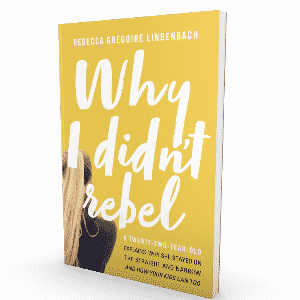
And what if I told you that a lot of typical parenting advice makes rebellion more likely?
I interviewed 25 young adults, trying to figure out what made them rebel or not.
Here's what I found!
January 10, 2019
Our First To Love, Honor and Vacuum Podcast!
Today the first episode of the To Love, Honor and Vacuum podcast launches!
Listen in here:
Each week on the podcast I plan to have about 4 sections:
A main segment where I elaborate on the month’s theme and say things I don’t have room to say in my Wednesday posts!
A millennial marriage segment which will usually feature my daughter Rebecca and me, but may sometimes feature Rebecca and her husband Connor, or Joanna who also works for me. We have such awesome discussions on FaceTime everyday I’d love to make them more widely available! And we’ll be commenting on some article in the news or something timely.
A reader question–I get so many of these, and I’ll try to answer a new one each podcast!
Something awesome from some commenters that happened that week.
I know that not all of you like to listen to podcasts, and some of you like to read more. So I’m going to link to some of the resources that I talk about on the podcast, and try to do a bit of a summary!
Main Segment: Are we asking the wrong questions about new year’s?
We tend to ask ourselves, “what do I want for 2019?” But what if that’s the wrong starting point?
What if the question really should be, “What does God have for me in 2019?”
You see, I think we’ve gotten things mixed up lately, and we believe that life should be relatively easy. We’ve forgotten that some things are worth working for, and that life was not supposed to just be about leisure.
This month on Wednesdays we’re talking about how our habits may be holding us back, whether it’s health or video games or attitudes or anything like that. But I wrote an article a few years ago that talks about this change in belief:
Have We Forgotten How to Be a Mommy
And the books I referred to in the podcast that I just LOVE for kids (they’re some of the best readalouds once kids hit 5 or 6) are the Beverly Cleary Ramona books.


The Ramona Books
by Beverly Cleary
Take Me There!
Millennial Marriage: Can We Talk about the Mommy Wine Culture?
Here’s the article we were discussing:
How Mommy Wine Culture Normalized Alcoholism in North America
If we think that we can’t cope with normal “mommy” life without drinking, maybe we need to ask why is that life so difficult in the first place? Deal with the underlying causes! Here are some posts that may help:
Like this post so far? You should also check out:

How to Stop Tantrums Before They Start

10 Ways to Discipline WITHOUT Spanking

10 Reasons Women Feel More like a Maid than a Wife and a Mother!

Raising Kids You Like–not merely love
Reader Question: My Husband Only Gets Aroused by Manual Manipulation of His Genitals
So here’s the scenario: she likes sex, and he has a fairly low libido. And he can only get an erection if she actually directly uses her hand on him. He doesn’t get aroused any other way. She’s asking if this is normal. And she’s quite sure that he doesn’t use porn.
I’d say it’s worth looking at these possible issues:
Medical Issues (which could include low testosterone as well as depression, or other things)
Psychological Issues (issues with intimacy; if he has trouble getting vulnerable with you in general or if he’s rather aloof, I’d look at whether he’s got wounds from his past that haven’t been dealt with)
History of Masturbation (even if he’s not masturbating now). IF he trained his body to only be aroused by touch, then he may need that direct stimulation.
I’d say #1 is most likely, especially low testosterone, and it’s a pretty easy fix if he sees his doctor. The key to all of it is good communication. If you can talk about it openly and say, “God made this to be amazing, so let’s not miss out!”, you’ll get much further.
Comment from a Guy Whose Wife Never Wants Sex
Finally, I shared a comment that a man left on this blog about a wife who is never interested in sex. Seriously, this is so damaging to a marriage! Women, if this is you–don’t stand for it. Deal with marriage problems if they are keeping you from making love. But if it’s simply low libido, don’t miss out on a huge part of your marriage like this! Please.
More posts to help:
Like this post so far? You should also check out:


What Does It Really Mean to Be Attracted to Your Spouse?

Why Do I Never Want to Say Yes When My Husband Initiates?

Do We Understand What Rejection Does to Husbands?
So there you go! Everything that we covered in the podcast. I hope you have a chance to listen. I’m planning on doing one every week, and they should be available at whatever player you use for podcasts–Google Play, iTunes, Spotify, Stitcher. Right now we’ve submitted them to all of those places, and they should be live (I’m writing this post ahead of time, but I’m hoping they’re live there!). If not, you should be able to subscribe next week, when the next one publishes.
Thanks again! And tell me if there’s a feature you’d like to see.
Author
Social Media
Sheila's Best Posts
Books
Courses
Freebie
 Sheila Wray Gregoire has been married for 26 years and happily married for 21! She loves traveling around North America with her hubby in their RV, giving her signature "Girl Talk" about sex and marriage. And she's written 8 books. About sex and marriage. See a theme here? Plus she knits. Even in line at the grocery store.
Sheila Wray Gregoire has been married for 26 years and happily married for 21! She loves traveling around North America with her hubby in their RV, giving her signature "Girl Talk" about sex and marriage. And she's written 8 books. About sex and marriage. See a theme here? Plus she knits. Even in line at the grocery store. Find Sheila Here:
Find Sheila Here:YouTube
Sheila's Favorite Posts on To Love, Honor and Vacuum:
10 ways to initiate sex
10 Effects of Porn on Your Brain, Marriage, & Sex Life
Why So Much Marriage Advice is So Trite
How can Sex be Hot and Holy at the Same Time?
Check out some of Sheila's Books:
The Good Girl's Guide to Great Sex
31 Days to Great Sex
9 Thoughts That Can Change Your Marriage
To Love, Honor, and Vacuum
Check out Sheila's Courses:
The Boost Your Libido Course
The Whole Story: Talking to Your Daughter about Sex, Puberty, and Growing Up
The FREE Emotional Intimacy E-Course
Are you ready to take your marriage to the next level?
Sign up for our emails and get access to the TLHV free marriage and parenting resource library. We have over 25 downloads and are constantly adding more. Sign up here!
January 9, 2019
Can You Handle The Truth? Let’s Take Responsibility for Our Choices
There’s a search for a “lightness of the soul” among my generation.
It’s Rebecca (Sheila’s daughter) here on the blog today, and I want to continue our theme this month about how sometimes our habits and attitudes may be holding us back from the life that God has for us. And I think that’s true especially with the aims of my generation.
We talk about avoiding negativity, and live by inspiring mantras that, when you break them down, don’t actually say much of anything. We throw out all our things and become a minimalist so that we aren’t dragged down by physical belongings. We don’t like to get too stressed out about buying a house, getting married immediately, or even finding the “right” job in our twenties–these are our years to find ourselves.
And I think a lot of this worldview shift is because we feel that we’ve lost purpose and joy and we’re desperately trying to find it by any means necessary. I mean, look at what live is like compared to how it was when our parents were growing up in the 60s and 70s: we’re having fewer kids now and getting married later which means we spend more time alone; we live in communities where we don’t know our neighbours, leading to isolation; we’re addicted to being entertained, and have more food options that are less healthy and more accessible than ever before; and to top it all off, we’re obsessed with getting approval from others online.
So we look around at our overwhelming, stressful lives and blame our lack of joy on an excess of “baggage,” whether it be responsibilities, family ties, or even physical belongings. We don’t even consider that maybe we’re missing out on something big that’s causing everything else to feel like “too much.”
And so we keep on trying to escape more and more with the end goal being that we have absolutely nothing in a mad pursuit to finally feel happy with ourselves.
What if the reason we feel we live joyless lives isn't because of too much stress--it's because we've forgotten the key to joy entirely? Click To Tweet
But what if joy isn’t something you find by running away from stress?
What if the reason we don’t have a lot of joy these days isn’t because of circumstance, but because of how we make our choices?
The world right now is very self-centered. Social media alone is responsible for a huge part of that. Recently there have been all sorts of incredibly well-intended movements to help people accept and love themselves no matter what. But as I see them go by my timeline, I have to wonder–have we forgotten to remind people that sometimes they just need to grow up and accept that they may be the problem?
My social media newsfeeds are filled with memes to help people accept and love themselves no matter what. But I have to wonder--have we forgotten to remind people that sometimes they just need to grow up and accept that they may be the problem?Click To Tweet
I know that may seem a bit harsh, but it’s a real concern of mine that we are substituting pats on the back for taking responsibility of our lives. I’ve noticed that recently, people seem to try to seek joy in two ways:
they get rid of or avoid entirely the thing that is bothering them or might tie them down, or
they give themselves a good reason for why it’s not their fault and why it’s not their responsibility.
I’ve seen a lot of my friends avoid having a family or settling down simply because they’re afraid they might miss something better around the corner. So they travel, they date, but they never really “grow up” and as a result they feel psychologically lost at sea. They avoid the “scary” decision that could bring a sense of purpose, belonging, and opportunity for growth because, frankly, it’s risky and they don’t want to have to sacrifice their lifestyle.
Or we get emails from husbands who say, “It’s not my fault I’m addicted to porn–if my wife would just have sex with me I wouldn’t have to look at porn anymore.” That’s the second tactic: place blame at someone else’s feet so you don’t have to admit that it is, in fact, at least partially your fault.
And seeing people avoid or rationalize instead of take charge really hurts my heart.
I’m a very justice-oriented person. So frankly, it makes me angry when people place the blame for their own problems on someone else’s feet. I’ve done that before myself. When I was in university I struggled with quite severe anxiety where I was having multiple panic attacks a week for almost a year, and then just your good-old run-of-the-mill anxiety for another year and a half after that.
And I pointed the finger at everything but me.
I got angry at Connor, my boyfriend at the time. I yelled at my mom (a lot). I got angry that no one knew the right things to say to me.
And you know what it did? It sapped my relationships of all joy. It drained Connor to the point that he had to withdraw from me at times. It made my relationship with my mom really difficult, especially leading up to my wedding (which anyone can tell you is just a joy without anxiety issues). And it made me an incredibly miserable person who couldn’t see an end in sight.
Rationalizing bad behaviours and habits is just a fancy way of lying to yourself. Live in truth! Even when it hurts. Click To Tweet
When I look back on that time of my life, I wish I had simply taken responsibility.
It wasn’t my fault that I had anxiety–it felt very much like a switch just flipped on in my brain and I couldn’t turn it off. But I needed to take responsibility of it as my problem, one that I had accidentally created in myself, and one that was my responsibility to fix. No one else could fix it for me. It wasn’t Connor’s fault that he couldn’t stop my panic attacks. It wasn’t my mom’s fault that she didn’t know the exact right thing to say. And by blaming both of them for so long in my heart, I delayed the healing that I so badly needed.
This month on the blog we’re talking about emotional or psychological addictions that steal your joy. I honestly believe I had an emotional addiction to my anxiety–it was almost like my comfort blanket. I got to a point where I didn’t know who I was without it, and it gave me very clear instructions on how to live my life. It was actually pretty comforting, if you ignore all the panic and distress.
I think this inability to accept responsibility for the addictions and bad habits that are stealing our joy is one of the main roadblocks that we put up in the way of healing. Those husbands who rationalize porn use on their wives’ low libido need to take responsibility and quit porn even if their wives never had sex with them again. People who waste hours upon hours of time on time wasters or video games in a life-draining way need to exercise some self control and re-engage with the people around them.
But a more difficult one to talk about is food. We’ve been talking about this mindset shift from simply “losing weight” to getting to a point where we’re truly thriving in the bodies God has given us.
I simply don’t think we can do that if we’re still clinging onto these rationalizations and not taking responsibility.
We try going gluten-free, the new fad diet, or cutting out entire food groups to try to lose weight instead of actually cleaning up our diets and exercising. Because taking responsibility for eating too much is, frankly, really painful to do. Or we give ourselves excuses for being dangerously unhealthy by saying that some contributing factors like metabolic issues or hypothyroidism are the sole cause when really, our diet and exercise routines are not healthy.
But here’s the problem: rationalizing your problems away are not effective ways to find joy because they don’t allow you to live in truth.

Here’s the truth: You want a better, healthier life than what you’ve had so far and you can take steps to get there. God has given you that ability–you have that freedom to choose. If you struggle with health issues or are on medications that make it difficult to lose weight, the journey will be harder for you but you are not a helpless victim of circumstance. You still have the ability to exercise self-control and limit your portion sizes and exercise to maintain a healthy routine, regardless of whatever weight you end up being. Listen, people with mental health issues can tell you: the anxiety never goes away. I have to work 20 times harder than people who haven’t ever had anxiety disorders or panic disorder to not spiral when something goes wrong. I understand that this might be something that I battle with my whole life. But that’s the point: I am battling it. I’m not sitting by and letting it have power over me anymore.
God has EQUIPPED you to deal with the battles in your life. And if they seem harder than other people's battles? He'll equip you MORE. Don't give up.Click To Tweet
Responsibility doesn’t need to be scary. God created us for more, and He says very clearly that we are each to carry our own load–we’re to do what’s in our responsibility (Galatians 6:5). And we reap what we sow (Galatians 6:7)–which is why this rationalization and avoiding doesn’t actually make us happy; it doesn’t fit with God’s design.
What I’d love to see is more people empowered to live life trusting they are equipped as God promised He would equip them to handle the battle ahead. We all have things that are harder for us than they are for other people; it’s not fair, but it’s life. And you have been equipped to deal with it.
What do you think? Do we often rationalize excuses rather than do what needs to be done? Let’s talk in the comments!
Author
Social Media
Previous Posts
Products
Freebie
 Rebecca Gregoire Lindenbach is a 23-year-old Canadian blogger/author and the daughter of Sheila Wray Gregoire. Married since 2015, she is passionate about helping others challenge the status quo and live for more, whether in their relationships, their educational or occupational goals, or their walks with God. And yes, like her mother, she also knits.
Rebecca Gregoire Lindenbach is a 23-year-old Canadian blogger/author and the daughter of Sheila Wray Gregoire. Married since 2015, she is passionate about helping others challenge the status quo and live for more, whether in their relationships, their educational or occupational goals, or their walks with God. And yes, like her mother, she also knits.
 Find Rebecca Here:
Find Rebecca Here:
Facebook
Twitter
Instagram
Pinterest
Rebecca's Website
Other posts by Rebecca on To Love, Honor and Vacuum:
Retraining Your Brain to Fantasize about HIM--And No One Else!
Should it be a Struggle to Not Have Sex Before You’re Married?
10 of the Best Decisions You Can Make in Your First Year of Marriage
How To Not Be a Legalistic Parent
Why I Didn't Rebel (my most viral post ever)
Read the rest of Rebecca's posts on TLHV here!
 Check out Rebecca's book and course:
Check out Rebecca's book and course:
Why I Didn't Rebel. Ever wondered why some kids rebel and some don't? Or do you believe rebellion is inevitable? Rebecca interviewed 25 young adults and dove into psychology research to find out: what makes some kids rebel, and some stay on the straight-and-narrow?
The Whole Story: Not-So-Scary Talks about Sex, Puberty, and Growing Up. Scared to talk to your daughter about puberty? Rebecca and her sister Katie want to do the hard part for you. This course is designed to start conversations to bring you closer together and strengthen your mother-daughter bond while giving your daughter all the information she needs as she becomes a woman.
Teenage rebellion doesn't need to be a part of your family's story. You can help your kids live for more! Get the first chapter of Why I Didn't Rebel for free here!
Like this post? Check out the rest of the series:

When Your Spouse Won’t Get Healthy

Is Your Relationship with Food Hurting Your Marriage?

What Happened to Our Marriage When We Overcame Our Food Addiction

10 Awesome Marriage Habits to Start This New Year!














